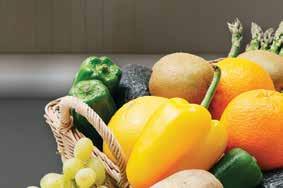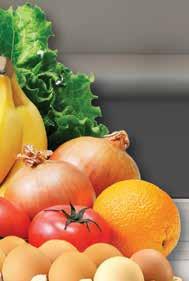
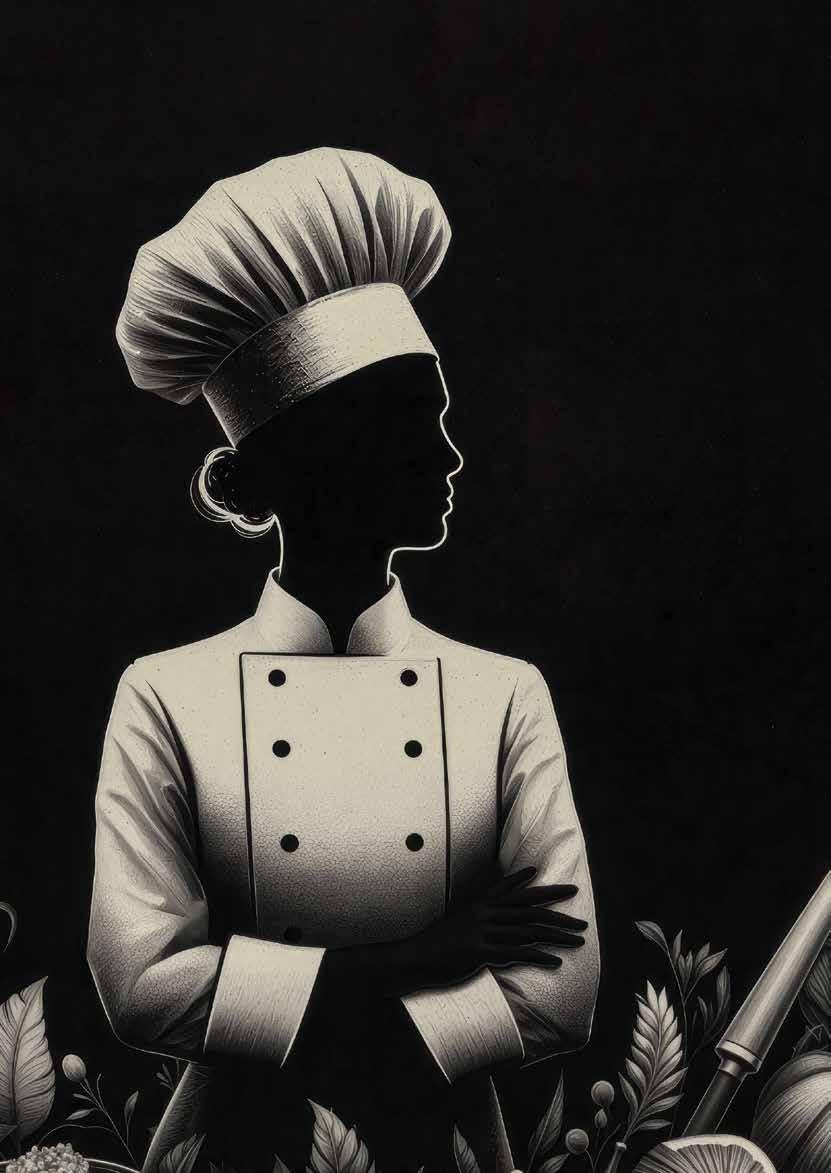



IF YOU CAN SEE IT, YOU CAN BE IT

THE JACKET FINALLY FITS

UP FOR A CHALLENGE
and inspiring future culinary talent

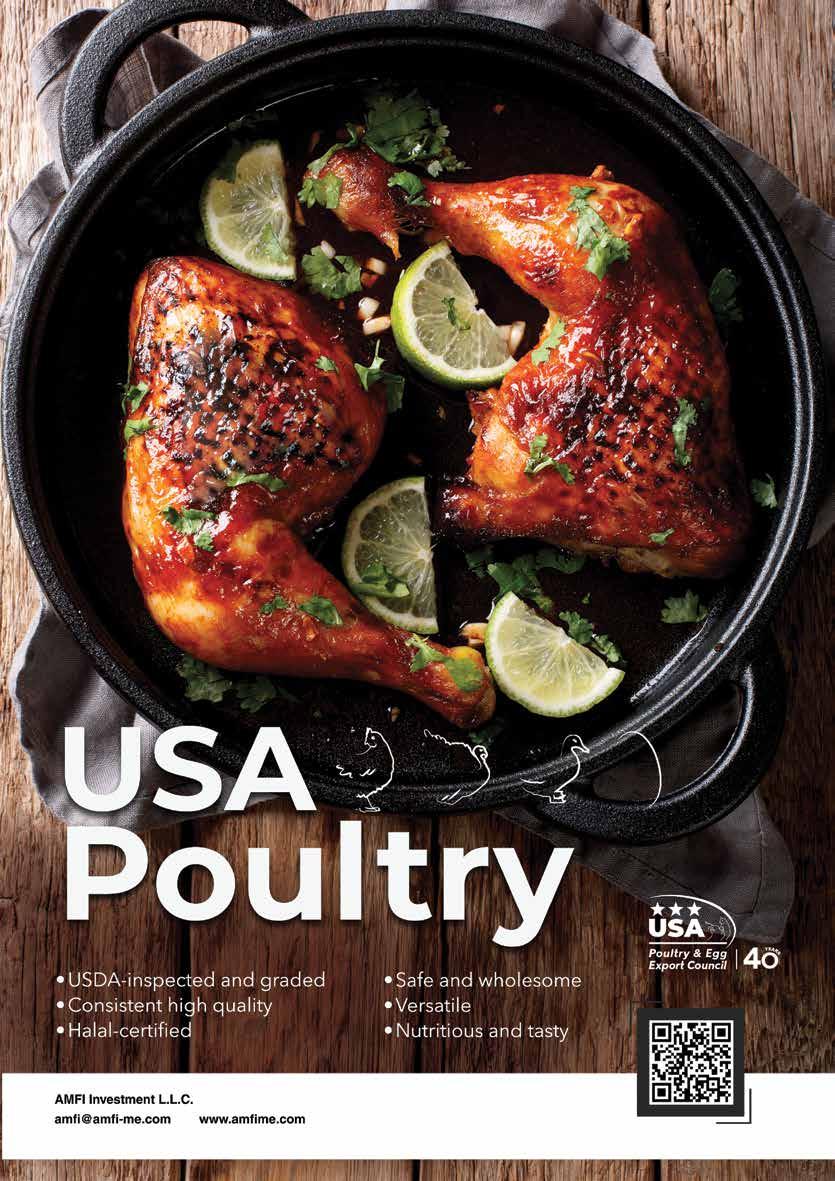
email editor@gulfgourmet.org
This year, for Gulf Gourmet magazine by the Emirates Culinary Guild, is extremely special. This year, we mark two decades of sharing the stories and achievements of chefs. We hope the trust placed in us has been reflected in our work throughout these years.
To celebrate this significant milestone, this year we are featuring more stories from diverse voices across the industry. This month, we shine a spotlight on women in the industry who deserve more than just a single magazine edition in their honor. We want to celebrate diversity and inclusivity every day, and this commitment is reflected in the magazine's evolving focus over recent years.
For the first time in over a decade, our cover does not feature a chef but a striking silhouette, symbolizing not just one woman, but the many women leading change in the industry. These women are stirring the pot with their skills, leadership, mentorship, and strong advice.
Women chefs have been changing the culinary world for years, bringing fresh ideas, creativity, and strength to the kitchen. More and more women are leading kitchens, creating new menus, and guiding future chefs, showing that skill is not about gender. And though the path has not always been easy for them, they have shown incredible resilience and leadership in overcoming obstacles and reshaping the industry. Their courage, innovation, and dedication inspire change and open doors for future generations.
Among the many standout articles, you will also find information about David Sprakes, Creative Director at Ronai, who discusses the journey behind Shefwear, designing uniforms for women chefs, and helping shift the conversation about inclusivity in professional kitchens.
We also feature insights from Emma Banks, Vice President of Food & Beverage Strategy & Development for Hilton EMEA. Emma's philosophy of empathy, clarity, and paying it forward is reshaping leadership across Europe, the Middle East, and Africa.
On a solemn note, we take a moment to remember Chef Norbert, whose dedication to mentoring judges and chefs for over 25 years has left a permanent legacy in our guild. His generosity, whether guiding us through technical details or driving teams to competitions, his kindness, and his big heart will be sorely missed. Chef Norbert's legacy lives on in the countless lives he touched with his knowledge, humor, and generosity.
Lastly, this edition includes powerful op-eds from women leaders on balancing parenthood and professional life, to practicing empathetic leadership. Their stories of grit and grace, passion and skill, show us that though barriers remain, so does the resilience to break them.
I want to extend a heartfelt thank you to all the advertisers, partners, and members who have supported us.

Thanks to you, we have been able to keep our focus on chefs and their stories.
We invite you to explore past issues at https://issuu.com/gulfgourmetmagazine and emiratesculinaryguild.net to stay updated on events and news. If you have not already, follow us on social media to see what chefs around the world are creating, and perhaps connect with someone who inspires you.
Take a moment to explore the company profiles of our corporate members. Also, do look at the Friends of the Guild pages to see all of our amazing supporters. These are the people and companies that help us keep the spotlight where it belongs: on chefs.
As always, if there is something you would like to see in a future issue, send us an email. Let us know what matters to you, what stories you want told, and what lessons you have learned along the way.
If you have any questions about the events, please reach out to us at emiratesculinaryguild@gmail.com
Thank you for being part of this journey with us. Wishing you an inspiring read, keep cooking, keep learning, and have faith in yourself.
Culinary Regards, Alan Orreal

President's
President Alan Orreal shares his thoughts on 20 Years of
Salon du Chocolat et de la Pâtisserie Dubai returns
The event is set to welcome over 7,000 professional visitors and 120 exhibitors, from artisan chocolatiers, confectioners, equipment and ingredient suppliers
Chef Patricia Roig on what it means to
Gauri Devidayal, Director and Co-founder of Food Matters Group, on steering brands through change, and leading with authenticity
An exclusive Q&A with Emma Banks, Vice President, F&B Strategy & Development, Hilton EMEA, on leadership, redefining success, and why hospitality starts with people

EMIRATES Andy Cuthbert
CULINARY
Coordinator +971 56 801 4089 emiratesculinaryguild@gmail.com Alan Orreal
Micheel
EDITORIAL Andy Cuthbert
Amaresh Bhaskaran Associate Publisher amaresh@amareshbhaskaran.com +971 50 456 8161
Chef
Executive building where every
Moms in the
Chef Soul Abouzahr reality of culinary it for anything
Boundaries
Food Stylist to go against listen to
Unshackling from Convention
Delmè Jacobs against stereotypes
The Jacket Finally Fits
A photo story vision of at Ronai that is both women chefs
Pastry, Eventually Chef Nishanti heap of practice
Chef Andrea Karidis of success
Vahiju PC Art Director COPYRIGHT
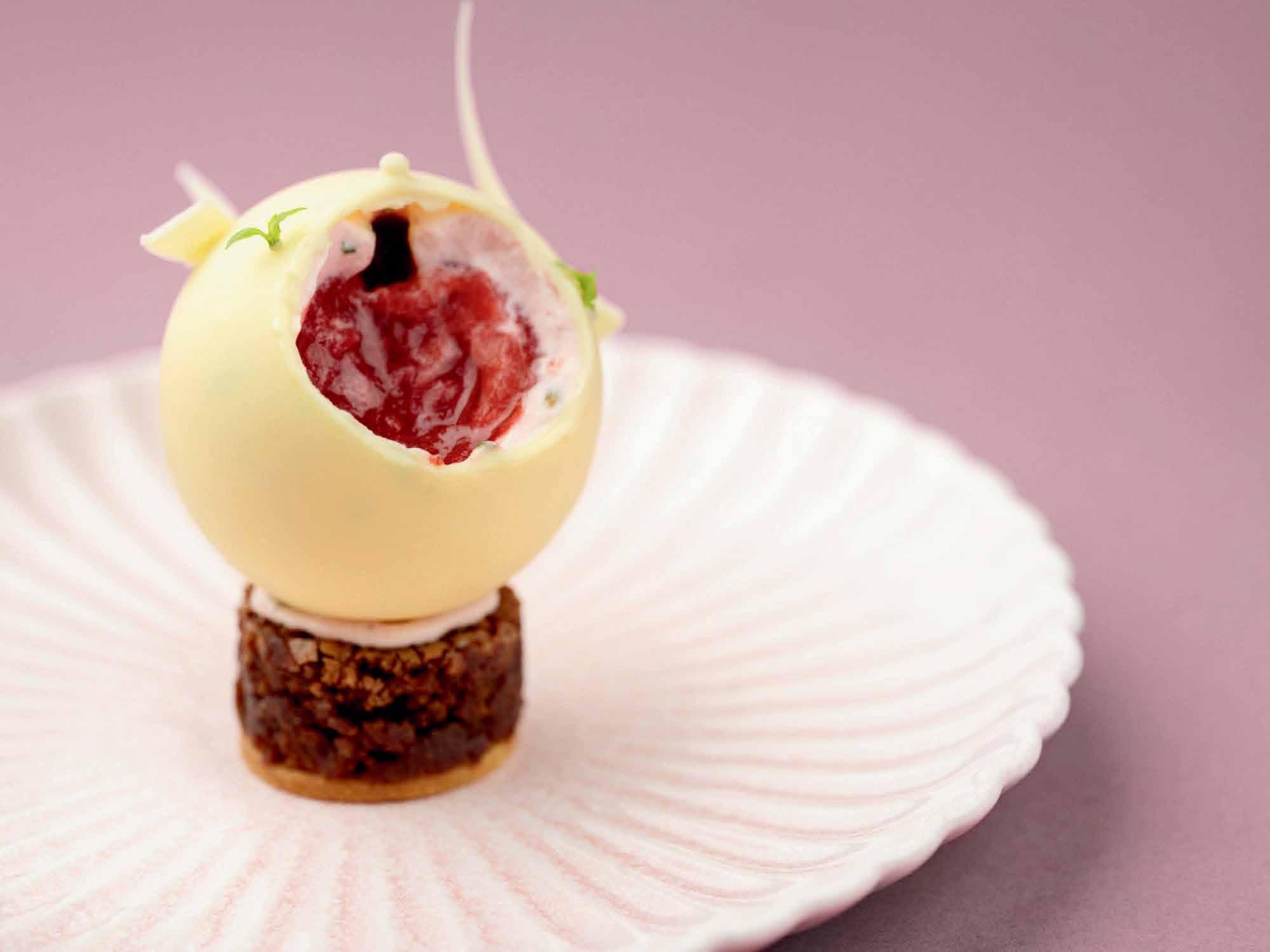
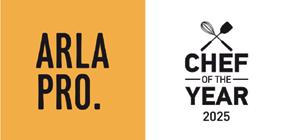















































Dubai’s premier chocolate and pastry event will mark its largest edition to date, bringing together global artisans, live competitions, and the spectacular Chocolate Fashion Show
Salon du Chocolat et de la Pâtisserie Dubai is launching its fourth edition from September 30 to October 2, 2025, at Madinat Jumeirah, Madinat Arena. The event is set to welcome over 7,000 professional visitors and 120 exhibitors, from artisan chocolatiers, confectioners, gelato makers, and specialty coffee shops to date and honey producers, equipment and ingredient suppliers, as well as importers of chocolate, coffee and pastry goods.
The much-anticipated show will kick off with the popular Chocolate Fashion Show. Under the theme ‘A Sweet Journey Around the Globe,’ 14 stunning gowns made of chocolate, are set to be unveiled and showcased on the runway. These creations are the result of a collaboration between celebrated pastry chefs and fashion design students from ESMOD Dubai.
“Salon du Chocolat et de la Pâtisserie Dubai continues to attract chocolate, pastry, gelato and coffee lovers,” says Joumana Dammous-Salamé, managing director of Hospitality Services/HSME, the event organizer. She further adds, “This edition is our biggest so far, showcasing more exhibitors, more talent and more opportunities to connect with the artistry and innovation that shape the evolving trends in this sector.”
Pastry competitions, organized in

partnership with the Emirates Culinary Guild, will provide a valuable platform for chefs from leading hotels and pastry shops to compete in both live and display categories before a panel of distinguished judges, while worldrenowned chefs will host masterclasses, offering audiences the chance to learn the secrets behind exquisite creations and cutting-edge techniques.
For three action-packed days, visitors can enjoy live demonstrations at the Choco Demo, immersive sessions at the Pastry Show, and expert-led talks uncovering the latest trends and opportunities in chocolate, pastry, gelato, and coffee.
Maha El-Khoury, project and sales director of Hospitality Services/HSME,
Salon du Chocolat et de la Pâtisserie Dubai continues to attract
chocolate, pastry, gelato and coffee lovers
said, “It gives us great pleasure to be back in Dubai for our fourth edition. The program is incredibly rich, with 50 guests, 28 masterclasses and a variety of competitions recognizing local talent.”
One of the standout events is the Coffee in Good Spirits National Championship, held in partnership with the Specialty Coffee Association-UAE, which celebrates the art of pairing coffee with spirits through an exciting live competition.
Since its launch in Paris almost 30 years ago, Salon du Chocolat et de la Pâtisserie has become a global reference for those interested in discovering the latest chocolate and pastry trends. Today, the show is held in major cities around the world, including New York, Tokyo, London, Brussels, Cologne, Lyon, Shanghai, Marseille, Zurich, Cannes, Milan, Hong Kong, Riyadh, Beirut and beyond. ■
If ever there was a chef whose life in the kitchen was defined by generosity, it was Chef Norbert Girnth. Be it mentoring young chefs, welcoming international culinary teams into his own kitchen, or offering nuggets of encouragement, Chef Norbert gave his time, talent, and heart without hesitation.
It is with heavy hearts that we share the news of the passing of Chef Norbert Girnth, an influential figure in the global culinary world and a true friend to so many.
Chef Norbert served his apprenticeship at a Michelin-starred restaurant in Germany. His passion and precision led him to kitchens across Europe and North Africa, including Switzerland, France, Jersey in the Channel Islands, and Morocco. Two years later, he was on the flagship of the Holland-America Line, the legendary S/S Rotterdam.
A member of the Verband der Köche Deutschlands, a true culinary talent, and a treasured friend to all who had the privilege to know him, Chef Norbert built his career on precision, humility, and a passion for elevating the culinary arts.
Following two years of studying at the Heidelberg Hotel and Management School, he has held the position of Chef-Patron at his family-owned restaurant since 1970, a restaurant that his family has operated for the past two hundred years.
But his impact was not limited to the kitchen. Throughout his distinguished career, Chef Norbert has won over 30 gold culinary medals in international culinary competitions, setting the standard for excellence before transitioning
He built his career on precision, humility, and a passion for elevating the culinary arts
into a role as a mentor and judge. He brought his wisdom and integrity to judging panels. He was a member of judging teams in Manila, Bangkok, Singapore, Dubai, Chicago, Iceland, Kuala Lumpur, Strasbourg, Basel, Gent, and Johannesburg. His contributions to the Culinary Olympics cemented his legacy as one of the greats in his field. He twice served as Host-chef for the national team of Australia during the Culinary Olympics in Frankfurt. He also judged at the Culinary Olympics twice; first in 1996 in Berlin and again in 2000 in Erfurt.
Chef Norbert Girnth was a teacher, a passionate ambassador of culinary arts, and a dear friend to many. He began his journey with the Emirates in the early 1990s, when he was invited to judge at the Emirates Salon Culinaire competition with the Emirates Culinary Guild. From the initial visit, he became a dear friend and a highly esteemed judge in our culinary competition.
His long and distinguished career, built over decades in world-class kitchens and on international competition stages, made him an invaluable part of the culinary development here
in the Emirates. He was not only a celebrated competitor but a true mentor and supporter of culinary talent. He continued to support culinary teams globally when they came to compete in the Culinary Olympics, often giving up his restaurant kitchen to help them prepare for the Olympics. Such was his generous nature. His competition prowess was renowned, and having him on our judging panels significantly benefited the Emirates Culinary Guild in developing our competition.
Our chefs from the Emirates, particularly those in the artistic categories and ice carving competitions, have achieved notable success in the competition circuit, thanks to Chef Norbert's invaluable feedback and extensive knowledge of these artistic fields. Many of our chefs who are now traveling to the Culinary World Cup in Luxembourg and the Culinary Olympics in Germany express their gratitude to Chef Norbert for his guidance over the years. Without his guidance, the Emirates Culinary Guild would not have experienced the success we enjoy with our chefs abroad.
In particular, the chefs of the Emirates, especially those in artistic disciplines such as culinary displays and ice carving, have grown and succeeded with the help of Chef Norbert's mentorship. His knowledge, insight, and constructive feedback shaped the skills and confidence of many. Today, when our chefs compete on global stages like the Culinary World Cup in Luxembourg or the Culinary Olympics in Germany, his guidance continues to travel with them.
Chef Norbert also played a guiding
His knowledge, insight, and constructive feedback shaped the skills and confidence of many.
August-September 2025
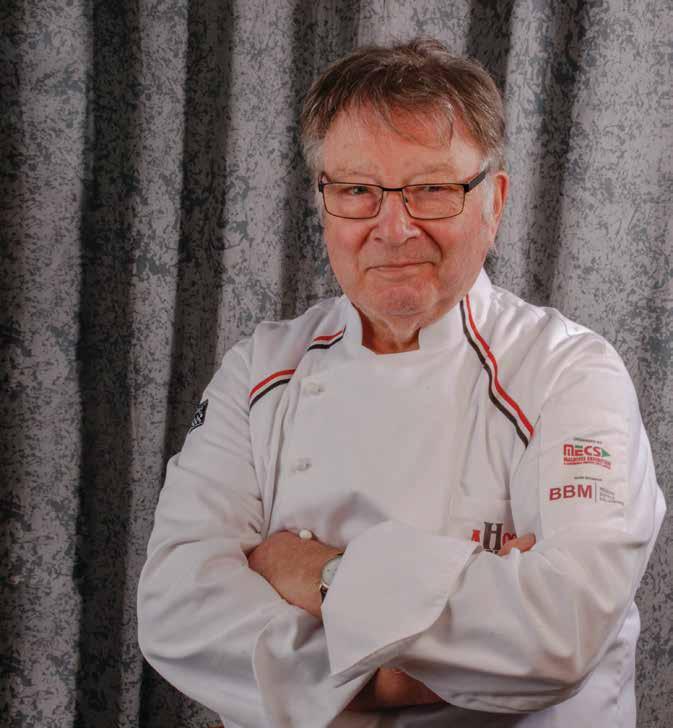
role in steering young judges toward excellence. With patience and clarity, he took time to guide aspiring and learning judges on how to evaluate technique, detail, presentation, and the final finished sculpture that made the difference between no medal and a striking Gold medal. Many of us, including me, learned a great deal from him over the past 25 years.
He attended nearly all of our 28 Emirates Salon Culinaire up until his final one in 2024. Not only did Chef Norbert travel
to the UAE to support the team, but he would also give up his time to be one of our drivers in Germany and Luxembourg when we would come to compete. Rising at 5 a.m., he took on the responsibility of driving the team bus to competitions, ensuring that the team arrived on time for their events and returned safely afterward. His selfless contributions underpinned the team's success and morale.
That selflessness, that big-hearted spirit, is what we will remember most. We will miss his cheeky smile, his
gentle humour, and his incredible stories from grand kitchens around the world. Rest well, our friend. Your presence will be missed at every competition, but your legacy will remain in every dish, every medal, and every young chef inspired by your example.
Rest in peace, Chef.
— With heartfelt condolences,
Andy, Coordinator of the Emirates Culinary Guild and Worldchefs President.
Your
Profile Is You and Your Portfolio!
Here’s Why Every Chef Needs a Digital
Let us face it, being a great chef today is not only about the great food you cook. But it is also about the story you tell. Whether you are leading a brigade in a 5-star kitchen, running your own cloud kitchen, or starting your culinary journey, how the world sees you matters.
In an industry that thrives on visibility, recognition, and credibility, personal branding is not optional anymore. It is an essential task. That’s where Foodverse Profile- FV Profile comes into play.
A space that is more than a CV, better than any social media profile, and entirely built to present, position, and grow you effectively.
Introducing FV Profile – Build Your Personal Brand Like Never Before FV Profile on Foodverse is designed for industry chefs, culinary students, industry professionals, and food enthusiasts, who are ready to be seen and recognised. This is where your persona, knowledge, skills, expertise, and achievements come alive.
So, what makes FV Profile different?
Unlike generic platforms, FV Profile is made exclusively for the food community. It speaks your language, understands your grind, and empowers you.
And how does that happen? FV Profile gives you the tools to:
Visually showcase your work with
effective content in the form of photos and videos,
Effectively share your journey and upload your certifications, experiences, events, and milestones
Building visibility among a curated network of experienced chefs, mentors, F&B brands, and industry decision-makers
Connecting with purpose, not just with followers, but with professionals who matter
MAKE YOUR PROFILE YOUR IDENTITY
SHOWCASE YOUR EXPERTISE, EXPERIENCE, AND ACHIEVEMENTS GAIN VISIBILITY AMONG CHEFS, INDUSTRY LEADERS, AND F&B BRANDS
The Power of Being Discovered
Here is the thing: Restaurants are hiring through platforms like this. Culinary competitions are scanning these profiles. Brands are selecting collaborators not based on who has more likes, but who has substance. That’s where FV Profile makes the cut. This is where you stand out, with everything about you in one scrollable, searchable space.
Are you a student just entering the food industry? Start now!
Building your FV Profile early lets you track your progress, upload key learning moments, and show potential employers how serious you are.
Are you already working in the industry? Now, bring your legacy online. Your FV
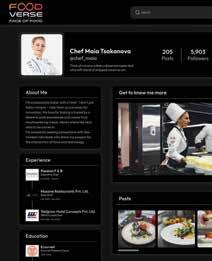
Profile becomes a living resume that evolves with you, reflecting your style, growth, and journey.
Foodverse is all about showing up. Showing up for a future where your name, your personal brand, and work speak louder than any caption ever could. So go ahead. Fill in your FV Profile. Upload your best work. Tell your story.
Let the world know who you are, and most importantly, why you are here.
Foodverse... Now Byte It!
Download the app on the App Store and Google Play Store. ■

It is with great pride and a full heart that I introduce the first-ever All-Woman Gulf Gourmet Edition, a labour of love that has finally come to life. This edition is not only a publication; it is a powerful statement. One that honours the women who have been the unsung heroes of kitchens and food businesses across the UAE and beyond. I am deeply grateful to Amaresh, Shreya, and Presidents Alan and Andy for their support, guidance, and belief in this vision. Without them, this moment would not have been possible.
But now, let us talk about why this matters.
For too long, the food and beverage industry has celebrated male chefs, male restaurateurs, and male leaders. The spotlight has too often overlooked the talented, hardworking, and competent women who bring a unique and transformative energy to this space. This edition is a bold, unfiltered spotlight on those very women chefs, business owners, and innovators who are shaping the future of food.
Women bring more than just skills to the kitchen. They bring empathy, unparalleled attention to detail, emotional intelligence, and a fierce dedication that stems from constantly having to prove themselves in spaces not built for them. And yet, they remain the underdogs. Not because they lack talent or drive, but because outdated societal norms and structural biases continue to question their commitment, capabilities, and career paths.

Whether it is being told that studying or working is not 'appropriate,' or being asked whether starting a family will impact job performance, the hurdles women face in the industry are often deeply personal. These questions are not posed to their male counterparts. And that imbalance needs to change.
Let 2025 be the year we stop questioning women's right to belong in this industry and start celebrating the values they consistently bring to the table: resilience, agility, compassion, and strength. These are not soft skills; these are power skills. And they are precisely what the future of food needs.
This edition also shines a spotlight on corporates who are walking the talk. The Hilton, under the visionary leadership
of Emma Banks and Sebastian Nohse, is a prime example of how gender parity is not just a goal; it is a reality being lived every day. Their commitment to inclusive hiring, leadership development, and operational equity is proof that with intention and the right people in the room, systemic change is possible.
So, let us no longer accept the excuse that "there aren't enough women chefs" or that "the industry isn't ready." Those narratives are tired and false. The truth is, gender parity in F&B is no longer a future ambition. It is happening now. And those who fail to acknowledge, support, or invest in it will soon find themselves left behind.
To the women featured in this special edition, thank you for your courage, your creativity, and your commitment. You are not only paving the way for the next generation but are also reimagining what leadership in this industry looks like.
And to everyone else: this is your invitation. Join us. Uplift women. Hire them. Promote them. Celebrate them. Because the future of F&B is not only inclusive, it is driven by talent, not gender, and the industry is stronger when we champion ability over outdated assumptions.
This is just the beginning. Let this edition mark the first of many where we turn the volume up on women's voices, stories, and achievements. It is time.
Tarryn-Leigh Green
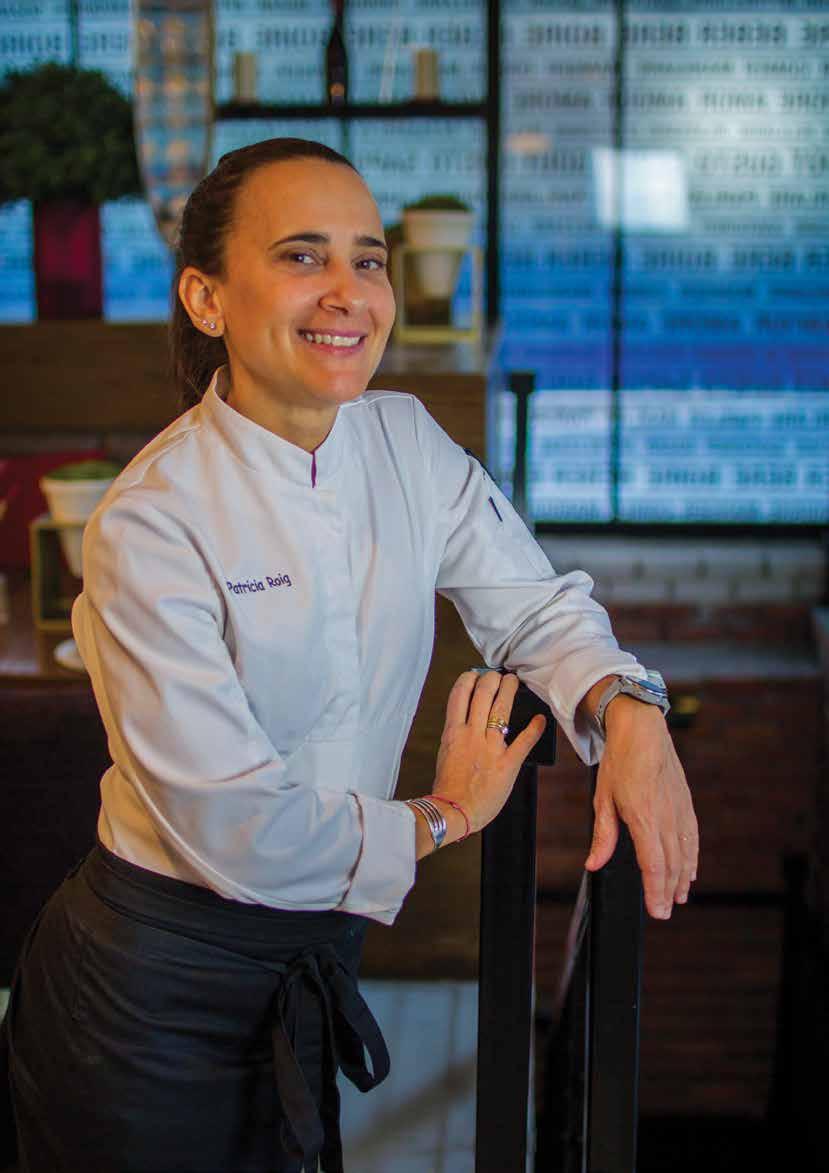
She cooks not for praise, but for joy in the process. She does not chase stars, yet her commitment to making sustainability tasteable has played a part in BOCA's three Green Michelin Stars. Chef Patricia Roig on what it means to live up to the challenge
By Shreya Asopa
Chef Patricia Roig has always believed that success is not measured by accolades alone; for her, it is about making an impact. And that belief is apparent in BOCA's growing recognition. The Dubai restaurant has earned numerous honors, including the Michelin Green Star for three consecutive years (2023, 2024, and 2025). In 2025, BOCA was also awarded one toque in the Gault&Millau UAE guide, received the MICHELIN Sommelier Award, and was named MENA 50 Best, ranked number 12, and Sustainable Restaurant of the Year 2025.
There is always a push between modernity and the obstinate pull of tradition. But it is precisely this tension that gives rise to a chef who shows us that it is absolutely possible for great food and environmental responsibility to go hand in hand.
Together with her team, she creates a menu that has shown innovation does not need to come at the cost of ethics. Ingredients like camel cheese and halophytes find their rightful place on plates, and the dining experience honors forgotten ingredients, local produce, and an inventive spirit.
Running a sustainable, ethical kitchen is no small feat. With over two decades spent in kitchens across the globe, from ROKA London, Lima Floral, Central Restaurante in Lima, and Abantal in Sevilla, she brings to BOCA not just recipes but wisdom.
Chef Patricia spoke to Gulf Gourmet about being the executive chef of a sustainable kitchen in Dubai. To her, it is not about simply branding a sustainable philosophy; it is an opportunity to challenge conventions, innovate, and let the food speak for itself.
You started your culinary journey in Seville, trained across Spain, and worked in London before becoming Executive Chef at BOCA. What
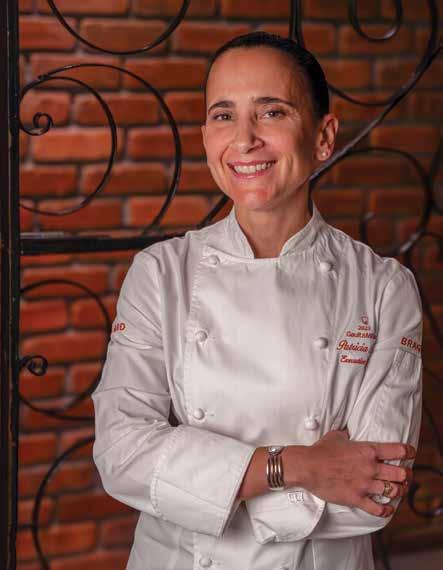
I chose this career purely out of passion, and it seems I hit the nail on the head
inspired you to pursue a culinary career? Was there a moment that made it all click?
I decided to dive into the world of cooking with no family background in it at all. In fact, this decision was dramatic at home! But I chose this career purely out of passion, and it seems I hit the nail on the head. It has been my only profession. Even though I later went back to university to study for a degree in Tourism, I have continued dedicating myself to cooking right up to today.
There was no single 'magic moment' or a big 'click,' just a strong pull towards the profession and the day-to-day life in the kitchen, with all its beautiful moments and the not-so-beautiful ones that truly drive my life.
Your journey has taken you from Spain to London, Peru, Ibiza, and now Dubai. What drew you to BOCA, and what was your vision when you first joined the team?
BOCA immediately captivated me for several reasons: its commitment to contemporary Mediterranean cuisine, the restaurant's incredible energy, and, something crucial for me, its strong emphasis on fresh, local, and sustainable produce. Coming from a culture where freshness and quality are the soul of every dish, finding a place in a city like Dubai that shares that same philosophy was, without a doubt, a true magnet.
Your style celebrates the natural flavor of ingredients. Can you discuss how you balance innovation with authenticity in Andalusian and Mediterranean cuisine?
The truth is, Andalusian and Mediterranean cuisine is all about pure authenticity. It boasts those deep, intense, traditional flavors built on very clear foundations. Here, cooking demands time and patience. There is always room for innovation, whether in techniques or ingredients, but, in my view, it is crucial to always have that depth and knowledge in the kitchen. Let me give you a clear example: if you do not have a perfectly cooked sofrito and a good broth made with patience and the best ingredients, you will never achieve that 'paella 2.0' you are aiming for!
BOCA has earned a Michelin Green Star three times. What does sustainability mean to you personally,
For me, sustainability is much more than a trend; it is a philosophy of life
and how do you bring that into your kitchen every day?
For me, sustainability is much more than just a trend; it is a philosophy of life and my way of understanding gastronomy. It means being aware of the impact of every choice I make, both in my daily life and in the kitchen, always thinking about the planet and its people. It is about respecting natural cycles, valuing our resources, and minimizing our negative impact on the environment.
I do not judge anyone's motivations. If someone embraces sustainability out of a trend or to 'show off,' that is great! Even then, we are still creating a positive impact.
At BOCA, sustainability translates into very concrete actions we integrate into every step of our work:
Local and Seasonal Produce: We prioritize what the land offers us, right here, right now.
Full Utilization and Less Waste: We use every part of the product and strive to generate minimal waste.
Responsible Waste Management: We ensure that what is left over is handled responsibly.
Smart Energy and Water Use: We are careful with every drop and every kilowatt.
Suppliers Who Share Our Values: We choose partners who are also committed to sustainability.
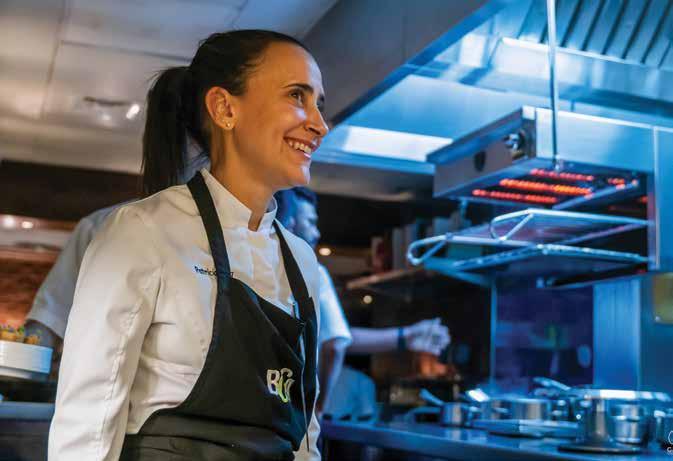
Of course, we always aim for the perfect balance so that our guests' experience is not only sustainable but also absolutely delicious and memorable!
As a woman leading a kitchen in one of Dubai's most sustainability-driven restaurants, what unique challenges or advantages have you experienced in the industry?
First and foremost, a restaurant is a business, and it has to operate like one. Sometimes, finding local and sustainable ingredients here in Dubai can be a real challenge, both logistically and financially. It demands extensive research, considerable ingenuity in our menus, and close collaboration with suppliers who share our vision. It is a delicate balance between delivering an exceptional culinary experience and staying true to our ecological principles.
But ultimately, what truly fulfills me is knowing that every decision we make in the kitchen has a positive impact. From reducing food waste to supporting local farmers, I feel I am contributing to a better future. It is an incredible sense of purpose that goes far beyond just cooking.
In short, being a woman leading a sustainable kitchen in Dubai is an exciting journey filled with continuous learning. It is an opportunity to challenge conventions, innovate, and, most importantly, to demonstrate that great food and environmental responsibility can absolutely go hand in hand.
You have spoken before about respecting ingredients, even those that do not "look perfect." How do you balance this sustainable mindset with high-end culinary expectations in a city like Dubai?
I do not believe the first thing we should "sell" to the customer is a sustainability label. For me, it is about meeting high expectations by offering an excellent product, professional preparation that enhances its qualities, and impeccable service. If, behind all of that, there is an ethical commitment to conservation and
respect for the environment, then that has a huge added value, both for us and for the customer's peace of mind.
Can you share a recent innovation at BOCA that helped reduce waste or showcase local, lesser-known ingredients?
At BOCA, we have been pushing hard on sustainability for years, and honestly, innovating in this space can sometimes be a challenge. However, with our latest menu, we decided to push even further. We really focused on finding and highlighting ingredients like camel cheese and halophytes. Even though these products have always been around locally, they are definitely not common in Dubai's restaurants. It is exciting to feature them and see our customers' surprise!
As a woman with over two decades of experience in a male-dominated field. Do you think it takes a different kind of muscle, whether mental, emotional, or even creative, to be a woman leading in this industry?
You definitely need a different kind of 'muscle' in this profession! Fifteen or twenty years ago, you pretty much had to be 'one of the guys' in how you acted, behaved, spoke, and tackled work challenges. Luckily, today, a woman in the kitchen is allowed to be more of herself. Our emotional side is incredibly strong, and you would not believe the practice you get; you can even cry while shouting out orders in a packed restaurant, hahaha!
What advice would you give to young women aspiring to lead kitchens, open their restaurants, or lead with purpose and change the industry for the better?
I firmly believe that women today who aspire to lead kitchens are already incredibly strong on their own and do not need specific advice just because of their gender. So, the general advice I would give is this: there is time to be a head chef, there is no rush.
You need to be confident and well-trained with every step you take. That way, when the day comes for you to lead a team, you will have almost absolute certainty that you are physically and psychologically strong, well-prepared, and capable. Because let us face it: this job is tough, and you have to be up to the challenge.
What do you hope people remember most about your food or their experience at BOCA?
I am not just looking for them to remember a specific dish, though, of course, I hope they love every single one. What truly fills me is for people to leave feeling like they have experienced something more than just a simple dinner. I want them to remember the freshness and honesty of our ingredients, and to feel the passion and care we put into every detail, from selecting our produce to how we serve it.
I want them to recall the authentic taste of Andalusia and the Mediterranean, a flavor that is both familiar and surprisingly vibrant. But beyond taste,
I would love for them to leave with a sense of well-being and the feeling of having eaten consciously. I hope they value all the effort we put into sustainability: reducing waste and supporting local producers. Ultimately, it is not just about what they ate, but how they felt while eating it: the welcoming atmosphere, the attentive service, and the warmth we always try to convey.
Have there been any women in the hospitality industry, past or present, who have inspired your approach to leadership and cooking?
The truth is, I have been fortunate to find inspiration in very influential figures who have enormously shaped my leadership, my passion for cooking,
Innovation does not need to come at the cost of ethics
and the person I am today. While my main mentors and role models in the industry have been men, their vision, work ethic, and commitment to excellence have been fundamental in molding me into the chef I am.
Every experience alongside them has given me valuable tools that I apply
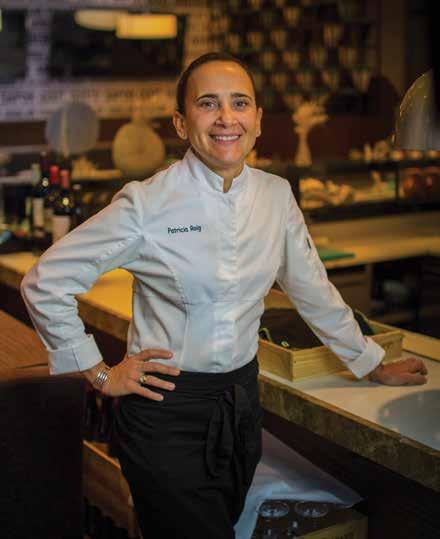
daily in my own kitchen. Ultimately, what inspires me most is pure dedication, no matter where that spark comes from.
What role do you think culinary education and internships play in breaking down gender barriers and promoting diversity and inclusivity in kitchens?
Today, inclusion, gender barriers, and diversity largely remain a matter of education and coaching. I truly believe that culinary training is the foundation of any career in this field. It is a person's first contact with the reality of the diversity found in a kitchen. That is why I think it is crucial for future chef educators to play a leading role in normalizing this diversity.
How do you define success in this next chapter of your career—awards, impact, legacy?
For me, success in this next chapter of my career goes far beyond awards. While recognition is always welcome and validates the effort, my true measure of success centers on impact.
I see impact on several levels. First, it is about the experience we create for every diner at BOCA. I want people to leave with a lasting memory, to enjoy cuisine that celebrates incredible produce, sustainability, and Mediterranean tradition with an innovative touch. I also aim to impact my team, inspiring them to grow, to be curious, and to genuinely love what they do. And, of course, I want to contribute to the industry, demonstrating that it is absolutely possible to operate a restaurant sustainably and ethically, even here in a vibrant city like Dubai.
As for a legacy, I do not see myself as extraordinary enough to think I will leave one behind. I simply want to do things in the best and fairest way possible while I am on this journey. If someone finds something worth holding onto from my work, I would be more than happy to share it. ■
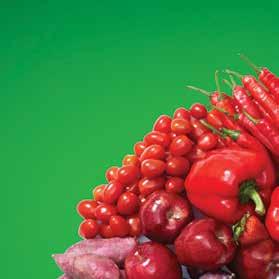

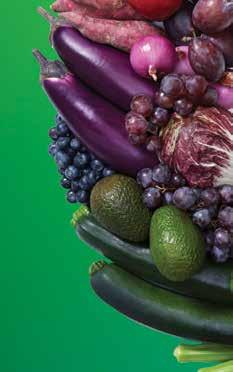


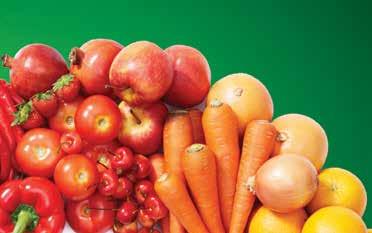














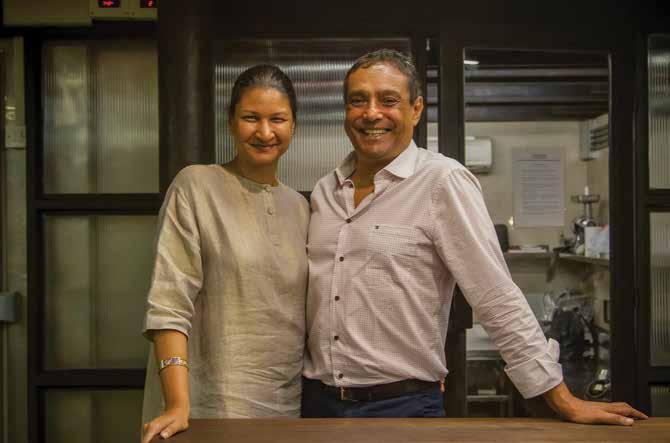
Despite no prior experience in F&B, Gauri Devidayal has co-founded some of Bombay’s most celebrated dining brands, from The Table which has ranked among Asia’s 50 Best Restaurants in the 2025 list, to Magazine St. Kitchen, Mag St. Bread Co., three outlets of Mag St. restaurants and Iktara. She is living proof of nothing ventured, nothing gained. Shreya Asopa speaks with Gauri Devidayal, Director and Co-founder of Food Matters Group, on steering brands through change, and leading with authenticity
Adistinguished law graduate from University College London and a Fellow of the Institute of Chartered Accountants in England and Wales, Gauri Devidayal seemed destined to live a life of balance sheets, predisposed as a rule-bound child rather than a spontaneous one.
So why hospitality? “Honestly, I do not have a reasonable answer,” she laughs. The memory takes her back to 2008, when she met her husband, Jay
Failure is not the end, it is a pivot point
Yousuf. He had just closed a previous venture and floated the idea of a restaurant. “Setting up a restaurant is not something you wake up and decide
to do, though that is exactly how it happened,” she smiles, adding that neither of them were chefs, but both shared a love for food.
“There was a clear gap in the market at that time. In Bombay, there were very few standalone dining options that offered the kind of food we do now. We loved going out to eat, but we just did not find enough choices available,” she recalls. Having played catch up with an industry they had not trained for,
Real change comes from shaping the world, not waiting for it to shape you
both harp on authenticity and personal taste as their lodestar.
From the outset, they positioned themselves as their own consumers, curating menus on what they enjoyed eating and what they felt the city lacked. “Everything we have done since opening our first restaurant has been through identifying gaps in the market,” she says. “It has always been about what we wanted for ourselves, and somehow, it turns out other people wanted it too.”
It did not take long for their restaurants to catch everyone’s fancy. Before long, the city felt like it had entered a new era of luxury dining. But the pièce de résistance was always the spaces themselves where guests felt like family yet always pleasantly surprised. Putting themselves in the consumer’s shoes was always their approach. The lack of rigid preconceptions became the turning point, guiding decisions from table setting to the latest menu tasting, which is why, decades later, their restaurants still feel like they were made just for you.
“It is challenging to predict how many people will come each day and how they will respond to what we offer,” she admits. “Ultimately, you have to start somewhere, and that starting point is often yourself.” Conviction, she insists, matters more than any test group. “You have to start with a concept you genuinely believe in and love. If you lack passion for it, selling it becomes very challenging.”
The flip side of not coming from the industry, she admits, is that it helped her think differently. “Maybe less business-
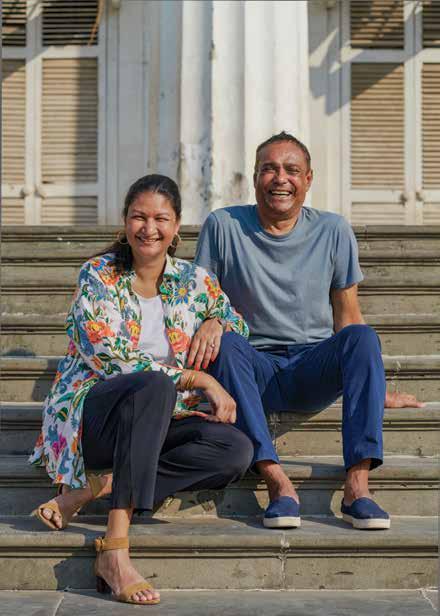
minded, but we have followed our instincts and created things we enjoy, believing that there are others like us who will appreciate them too. It has helped us build successful brands.”
Still, instinct is not infallible. Some concepts did not work, and they had to cut their losses and pivot. “This has come with a certain experience, the ability to be deeply in love with what you create, yet detached enough to walk away when it is not working,” she says, the candor unmistakable.
“Even if everyone says, ‘Do not take it personally,’ it is impossible not to. But you have to balance that with commercial realities. It is not the end of everything if something fails. You take what you have learned, and you move on.”
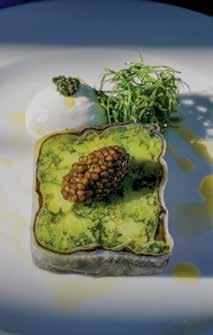
This industry, she says, is an endless table of possibilities, food, drinks, experiences, all waiting to be tried. “If one idea does not succeed, there are plenty of others. It is never a one-strikeand-you-are-out scenario.”
That mindset of reinvention was tested during the pandemic, a cauldron of deer-in-headlights moments for the entire industry. “One big learning from COVID is the importance of being quick to pivot,” she says. Overnight, dining rooms gave way to online delivery, and leather-bound menus became QR codes. Nimbleness became survival,” she says.
The same agility, she knows, is tested again as food technology continues to dissipate in dining experiences. If it is not AI, it is new novel ingredients. If it is not robotics, it is digitization.
“A lot of the technology today helps you understand your consumers better and market to them in more targeted ways.” In her view, technology should support, not replace. “Take a sous-vide machine, it is a brilliant tool that helps you achieve precise cooking temperatures. Tools like these are important. But replacing the human element? Achieving that level of replacement will take a long time, likely decades.”
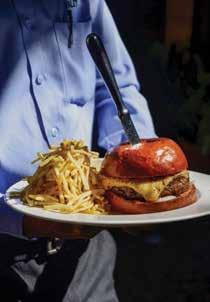
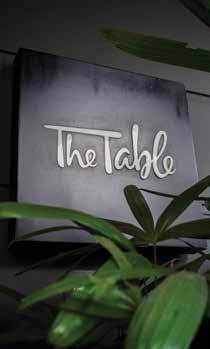
Accepting support is not a weakness, it is a strength
The Shift Within
Behind that voice, carrying gravitas, lies a stubborn determination to thrive on her own terms. Around the world, women are taking stock of the past, reshaping the present, and reimagining the future. She is part of that resounding shift, a movement of
meaning-makers built on the simple lesson that change begins within before it reshapes the world outside.
She recalls moments of bias, like walking into a government office where a man refused to address her directly, but also others where being a woman shifted the dynamic in her favor.
“I love what I do,” she says. “It is challenging, but I do not think women should be measured against men in terms of capabilities or achievements. Success is about being defined by your own standards. And if you are putting out a product of value, people will appreciate it. They do not partner with me because I am a woman or with my husband because he is a man, they partner with us because they see a strong brand and want to be part of the story.”
On the upswing, she has always urged women not to fall into acquiescence. “Change your own perspective before expecting others to change theirs. The moment we see ourselves differently, the people around us inevitably will too.”
At 44, Gauri wears many hats, of businesswoman, mother to 12-yearold Dia, and Honorary Secretary of the
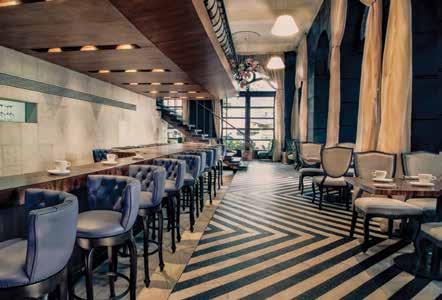
Move beyond
‘What’s in it for me?’ to ‘What’s in it for us?
National Restaurant Association of India. Her leadership has earned her recognition in Forbes India’s Leaders of Change, GQ’s Most Influential Young Indians, and more. She debuted as an author with Diamonds for Breakfast in 2023, which draws out the highs and lows, the behind-the-scenes and the stories, that built The Table and Food Matters Group as it stands today.
Asked how she manages it all, she points to her support system. “My family, my help at home, all stand by me. I am not shy about asking for help; it is a skill I have learned to value. Accepting support is not a weakness, it is a strength. It challenges misconceptions about what women can or cannot do.”
In life and in work, her better half has been more than a partner; he is someone who knows when to step back and let her belt out her own story, unfiltered and
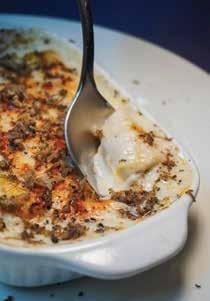
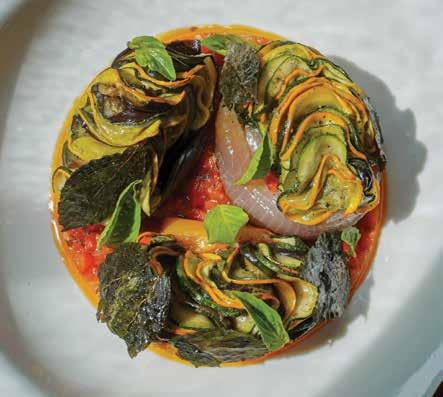
uncompromised. “I have always worked alongside my husband in this industry, and he recognizes that if this is something I excel at, he should let me take the lead. It works because of mutual respect, and because everyone, men, women, family, friends, has to contribute to creating the conditions for us to thrive.”
That belief in shared responsibility and community extends beyond the restaurant floor. Passionate about storytelling, she hosts the podcast Speak Greasy, amplifying voices of chefs not backed by glossy PR but rich
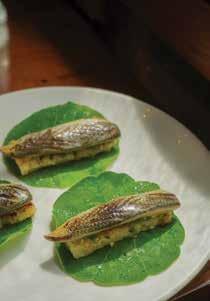
in stories as textured as their food. A recent season focused on women in hospitality, giving them space to share challenges and successes without being relegated as an afterthought in the industry narrative.
“But we need to move beyond ‘What is in it for me?’ and ask, ‘What is in it for us?’”
she says. “That is how we approach our restaurants too, not as transactions, but as experiences that build community and connection. Relevance is not only about the food, but about staying in people’s minds. And just like in the podcast, it is about amplifying voices, creating dialogue, and understanding that the industry grows stronger when everyone has a seat at the table.”
Her voice brightens when she speaks of the current moment in hospitality. The industry, she believes, is turning a corner. One day, she hopes, there will be no need for “special categories of awards” for women. That, to her, will be the truest marker of balance.
For someone who has wolfed down several challenges in her career, she has learned that perspective is the ultimate seasoning. Her wisdom, eloquent, layered, rings true to an old adage, real change comes from shaping the world around you, not waiting for it to shape you. ■
An exclusive Q&A with Emma Banks, Vice President, F&B Strategy & Development, Hilton EMEA, on leadership, redefining success, and why hospitality starts with people
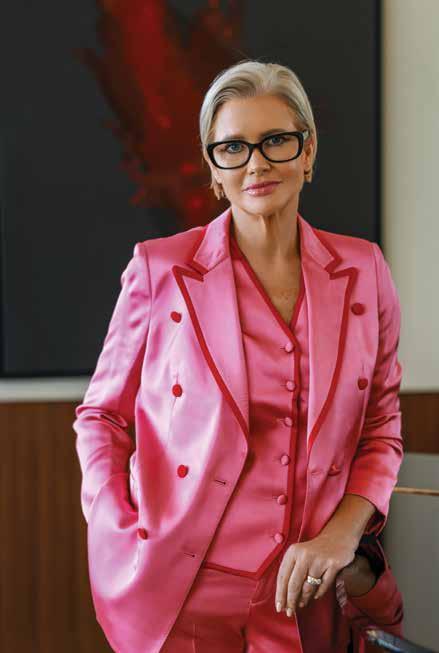
Emma Banks has spent her career building brands and the culture that sustains them. As Vice President of Food & Beverage Strategy & Development for Hilton across Europe, the Middle East, and Africa, she leads with clarity, empathy, and a 'pay it forward' philosophy. Be it analysing guest sentiment or redefining what leadership looks like, she stays the course with the conviction that what gets measured gets managed, and what gets nurtured, thrives.
Find out how she is turning innovative ideas into measurable results.
You've worked in hospitality since your early days in rural Wales, pulling pints and working summer jobs. What's one lesson from those early experiences that still influences your leadership style today?
I have worked across many different facets of the industry, from independents to large global hospitality companies, and there is one common thread: success is never accidental; it is always directly linked to action. The world's best operators never stand still. My leadership style and indeed our entire food and drink strategy is built on this 'hustle'.
How do you balance the creative and business aspects of F&B development, ensuring profitability while also delivering unique dining experiences? It is both an art and a science. I often say that in our business we are surrounded by data but starved of insight, however if you take the time to analyze the data
available, whether it be guest sentiment, menu engineering, venue revenue per hour, or simply assess market trend you will find a good strategic framework to direct creativity that will result in the most rewarding experience – both for your guest and your bottom line.
Success in hospitality isn't just about numbers. How do you personally measure success, through guest engagement, industry influence, or something else?
We are in the 'happiness business' –hospitality and the people who work in it are driven by the desire to please people; likewise, guests tend to visit restaurants and bars to enjoy life.
So, sentiment, whether of guests or team members, is the best metric of success; after all, we know that happy teams equal happy customers. At Hilton, we prize our culture above all else; it is what has resulted in our global recognition as the #1 Great Place To Work in Hospitality for the last eight years, so we work super hard on nurturing this sentiment with our team members all over the world. Additionally, we strive to fulfil our 'customer promise' to provide the most reliable and friendly stays for our guests; as such, our guest sentiment metrics are imperative to keeping us on track in our mission to create the world's best stay.
It goes without saying that top-tier recognition in the restaurant and bar business is the ultimate barometer of success from a consumer perception point of view, whilst commercial success is very easily measured on your bottom line!
The hospitality industry is constantly evolving. What trends or shifts are you most excited about right now?
I personally love the ever-increasing demand for conscious cuisine and mindful mixology, which has resulted in our chefs and bartenders becoming far more adept when it comes to adopting sustainable practices.

A challenge is simply an opportunity in disguise
I think the 'low and no' movement is super exciting. The fact that you can now go out and have an exquisite taste experience without alcohol is so inclusive and freeing, not to mention healthier!
And lastly, I am a big fan of experiential dining because it offers true escapism and much-needed fun!
What do you see as the current pain points in the F&B industry?
I think the greatest challenge facing our industry is the rising costs for operators versus the pressure to deliver value for consumers; it is becoming harder and harder.
We would love to know more about your Sustainability Playbook. Winning the Gulfood Sustainability Professional of the Year 2023 is a big deal! What's the most rewarding part of driving sustainability in the F&B space? One of the reasons I came to work for Hilton was because of the company values, which are deeply rooted in purpose. It was founded on the belief that hospitality can be a force for good, and as part of our global Travel with Purpose strategy, we report against science-based targets in line with the UN SDGs. I, like so many of our team members, am driven by the desire to create a positive impact in the communities we serve and to help shape the industry for a better future.
Knowing that what you do makes a difference is so rewarding and makes you feel like you are part of something bigger. When you land a project that has a genuine lasting impact and you see others follow suit, there is nothing better!
Balancing business growth with sustainability can be challenging, especially with tight margins. What strategies have worked for you, and how can industry-wide collaboration drive a unified approach across the fragmented hospitality sector?
For something to be truly sustainable, it has to work for both your business and the environment. What we have found over the past few years is that, actually, so many of these sustainable initiatives are wins both commercially and ethically. Take food waste reduction for example – by simply measuring your waste you can drastically reduce your carbon emissions and in so doing drive efficiencies and reduce your costs
– what you have to do is take the time to analyze the data you gather and then take immediate corrective action – and then get your teams to really engage with the exercise and commit wholeheartedly to making it work.
Now we have amazing systems such as Winnow and our own award-winning system for measuring and reporting our progress toward our Travel with Purpose goals, LightStay, to help track, but truthfully, this can be done manually too, without excessive cost.
needs) can reduce your costs and your impact on the environment.
Critically, it is about committing to something; building it into your company values, and then measuring your success. After all, what gets measured gets managed.
Hilton's 50-mile sourcing model and zero-waste techniques signal a shift toward hyper-local, sustainable food systems. Do you see this as a scalable solution, or is it limited by supply chain constraints?
Success is never accidental; it is always directly linked to action
We also lean into our economies of scale and take a holistic approach – when it comes to local sourcing, there will be some items that are cheaper, and some will inevitably be more expensive, but by looking at the whole basket versus the individual components, we have managed to get to a cost-neutral scenario. There are also examples of where being most eco-conscious in your approach can actually save you money; for instance, not giving someone a plastic straw in their drink (which is more often than not superfluous to
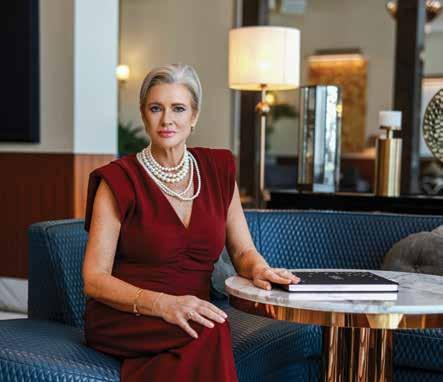
We commit globally to responsible sourcing with full transparency, it is built into the DNA of our procurement approach, and our 'HSM' (Hilton Supply Management) team is one of the Food & Drink Team's most important partners. When it comes to committing to 'local', it is obviously easier to do in some markets than others, and that is down to many different socio/economic factors. But local produce is not only better for the environment, it offers a much better experience for the guest: it is fresh when it hits the plate, and it often carries the cultural identity of our local area, offering that sense of place that modern travelers seek. Local procurement also supports the local economy, driving positive social impact, and also reduces food miles whilst increasing traceability. The challenge we all face is one of demand and expectation – we have all become far too used to having produce available the whole year round, but thankfully, the trend is moving ever more towards authentic seasonality, so this is gradually changing for the better. As for zero-waste techniques, this has now become a badge of honor in our kitchens and bars, and the creativity coming from our teams is mind-blowing. As the amazing chef Doug McMaster of Silo fame so rightly says, 'waste is a failure of the imagination'.
You've received several prestigious titles, including First Lady of the Hospitality Industry in the Middle East. Women in leadership inspire
the next generation. When women see others at the top, it becomes easier to envision their own success. How do you think media, brands, and businesses can amplify women's presence in F&B?
Inclusion in all its forms is dependent on role modelling – because if you can see it, you can be it. So, we all have a collective responsibility to use our platforms to shine a light on those who are breaking through barriers of entry and progression in all aspects of the industry.
The best way to 'amplify' inclusion is to commit to creating an environment where everyone can thrive. I remember some years ago when one of the media platforms was challenged by its readership for not including women in the list of top executive chefs in the region. Still, rightfully, the editor reminded the readers that they could only publish the chefs whom the hotel companies had put forward, so the list was but an accurate reflection of the status quo. So, it is the status quo that needs challenging.
For our part we use our food and drink platform 'Taste of Hilton' to amplify our women of F&D through two aptly titled content series: Shefs shines a light on our women in the kitchen, whilst Sheroes focuses on women in front of house operations: both formats tell these amazing women's stories in engaging short format and we use it to celebrate their success and also attract talent.
The EMEA region is diverse, with varying tastes and challenges. Your hotel chain is setting a benchmark for inclusivity in hospitality. What other impactful ways can the industry foster long-term inclusivity ( through policy shifts, mentorship, financial backing, or something else)?
Last year, we celebrated our eighth consecutive year as the top hospitality company on the World's Best Workplace list by Great Place to Work. At Hilton, we are focused on fostering an inclusive, supportive, and purpose-driven
We are in the happiness business— happy teams equal happy customers
workplace, unified by our shared, founding vision to fill the Earth with the light and warmth of hospitality, which is reflected in myriad programmes and policies and deeply entrenched in our value system. The key is to create a human experience at work where everyone can thrive, and success will follow!
Hospitality is known for its demanding pace. As a woman in leadership, how have you navigated challenges, and what personal philosophies have guided your success?
As they say, a challenge is simply an opportunity in disguise. So, when faced with a challenge, I prefer to arm myself with information, lean on experts for their insight, and then craft a plan.
Some years ago, I inherited a challenging region in a company that was restructured immediately after returning to work from maternity leave. I felt like I was drowning in every aspect of the business; it was a constant firefight, and I honestly thought I was going under. My new boss arrived and was incredibly supportive. She sat, she listened, and then she concluded: 'You are more than capable. All you need is a few good people around you and a plan." I live by this.
Surround yourself with great people, empower them, and always have a plan.
Storytelling is a powerful tool in professional spaces, especially in hospitality. How can women leaders and young chefs use storytelling to confidently express their impact without losing humility?
I have always worked on a 'pay it forward' mentality – I was lucky enough to have super supportive parents who taught me there was no such thing as a ceiling, glass or otherwise, likewise I have been super fortunate to have had some amazing mentors in my career – so I take the time to elevate others – using my personal platform to shine a light on brilliance (both male and female) of people busy doing what they love. Time is a super valuable commodity, so make a little time for someone when they need a boost – whether it be some simple advice or a friendly ear – it goes such a long way and can actually be transformational for people.
As hospitality transforms beyond traditional service, including sustainability, tech innovation, and personalized dining experiences, what skills and mindset will define its next generation of leaders?
A dear (and much respected) industry colleague talks about hospitality venues in terms of 'emotion per square foot' – they are spaces rooted in human connection as such, I think the most prized skills center on emotional intelligence and the ability to anticipate the needs of your employees and your consumers – as I said, happy team happy customers!
How do you maintain a healthy worklife balance while making time for your family and your growing family of pets?
I am very lucky in that I both work to live and live to work. I love what I do, and I derive great joy from working with my fantastic team and the wider network to drive the company vision and support the industry at large.
That said, I am at my happiest when I am with my daughter Lily and my husband Jon – and our ever-growing menagerie of rescue cats and dogs.
As for balance, anyone who knows me knows that I find my inner 'chi' on a spin bike at a hundred miles an hour. ■



Chef Helen Morris on the challenges of turning rich local produce into inspired food, and what Chef in the Woods showed about getting it right
There is a particular kind of quiet that hits you in the Shropshire countryside (where I grew up, surrounded by fields, rain soaked boots, and people who take their potatoes very seriously), the kind where you can hear the rustle of leaves before you hear a car, and the neighbour's cow lets you know it is breakfast time. It is the quiet that makes you slow down, breathe deeper, and inevitably think about lunch.
I grew up in this rural postcard of a village where the most scandalous event was the annual vegetable growing competition and the closest thing we had to nightlife was a horse breaking loose at dusk. To a restless child, it felt like the world was happening somewhere else, namely in the town, with its mysterious draw of shops, street life, and actual bus routes, and a bustling population of 6,500, including the surrounding villages. All we had were fields, the odd tractor, and a playing field that doubled as a muddy version of Glastonbury after mild drizzle.
But food… food was everything. Summers were a blur of podding peas on the doorstep like underpaid elves, sneaking strawberries straight off the plant, and dramatically rolling our eyes as grown-ups argued over which potato
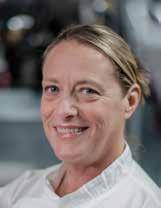
Stop overthinking. Even a cheese toastie can stand out
variety reigned supreme in this year's planting cycle. At the time, I did not realise we were living a lifestyle the rest of the world would later rebrand as artisanal and charge a pretty price for at a farmer's market. We were quietly marinating in something extraordinary, flavourful simplicity.
And somehow, the world caught up.
The things we took for granted, farmers' boxes, local beef, lamb, and poultry, eggs bought with coins left in a rusty honesty tin, are the height of eco-chic living. Organic? We just called it Tuesday.
Fast forward to today, and the things I used to grumble about, blackberry picking, potatoes dug from the soil with yesterday's spoon, and don't forget those peas, now give me a warm glow in my stomach and my soul.
Which brings me to the tragedy of many local eateries. How can a region bursting with fabulous produce still manage to serve up a soggy toasted cheese sandwich that tastes like it was made in 1987? Yes, I get it. Budgets are tight. But where is the flair? The imagination? The humble respect for a perfectly boiled spud with a sprig of mint? Somewhere between tired menus and over-complicated reinventions of classics, we have lost something. Even the humble cheese toasties can stand out, and a local food festival proved that! Just divine (bread, cheese, and butter –clarified, of course). Stop overthinking.
Now, picture this: a cold, sunny December morning in 2020, I am wrapped up like a Michelin man, wandering around the edge of a nature reserve close to home

(socially distanced, of course, outside). So, imagine my joy when it led me to something extraordinary, a little gem tucked away in a nature reserve I had once roamed as a teenager under the guise of 'going to the playing field.' Enter Chef in the Woods.
At first glance, it appeared to be a very stylish shed. It was a shed and nothing stylish. A few tree stump benches, a handmade sign, and the distant smell of something magical in pastry form. What this place lacked in polish, it made up for in soul.
It started during the COVID-19 pandemic, when a former chef, made redundant, set up a modest food outpost in the garden beside his family's house. A risk? Absolutely. But also, a retreat for the community in those tough times to have a conversation and a cup of tea and cake, for wandering souls like me, and for anyone who believes a hot pie can restore faith in the world.
The meat pies? Divine. The pastry? A masterclass in hot water crust magic. The fillings? Local, tender, and so good they should have come with a warning label. Before I knew it, this shed became my temple, my sanctuary. In the summer, you could walk there across two fields, and in winter, sit under a teepee that made you feel all fuzzy and content. Homemade cakes, breakfast butties, and a cheese and leek roll so good I dreamt about it. Let us not forget the famous special nose pie.
The first time I bit into one of those pies, still steaming, encased in a golden crust that sang of butter and good decisions, I swear time stopped. It was not just lunch.


Cooking is a conversation between the land, the season, and the eater
It was home. It was everything I loved about food: locally sourced, lovingly made, honest, and generous. The meat was from a neighbouring farm and the coffee from a local roastery – tick, tick, tick.
Over time, Chef in the Woods became more than a hidden food hut. Hot chocolates under grey skies. Cheese rolls that reminded me of lunchboxes in the '90s, only upgraded. Cakes that made you believe in second breakfasts. And in the winter, the teepee popped up, complete with fairy lights, garden seating, and the kind of atmosphere money cannot buy for that 'private dining' experience.
But perhaps what made it so special was its resistance to overcomplication. No QR codes. No Instagrammable gimmicks. Just real food, real people, real weather (usually freezing), and the gentle sizzle of a breakfast buttie being prepared. Simplicity was not a trend here; it was a philosophy.
And then, like a beloved series that ends too soon, it closed four years later. Weather, life, and the impossibility of running a dream on tight margins pulled the shutters down and slapped me like a wet lettuce in the face.
Despair! Chef Ben, in a heartbreakingly hopeful farewell, called it an 'optimistic see you later.' And I, along with most people, held my breath as the news rocketed through the town like a bullet train. We had lost our little gem.
Could Chef in the Woods rise again? Could a place like that survive long-term in a brick-and-mortar form? Could the magic of that little pie-shed-in-the-woods translate to an actual restaurant with rent, business rates, and the terrifying need for various licenses? Possibly. But something tells me the charm lay in its wildness, the sense of discovery, the honesty of its limitations, and the sheer joy of knowing your breakfast sandwich was made by hand, in a place where sheep and cattle outnumber people.
Still, not all hope is lost. Across Shropshire, passionate people are flying the flag for food done right. From Michelinrecommended restaurants tucked in sleepy towns, we have got not one, but two Michelin-recommended restaurants in a town small enough to lose your keys in, to brilliant pubs and cafes that honour their ingredients and their guests with heart and hospitality. They understand that cooking is a conversation between the land, the season, and the eater.
And maybe that is the quiet legacy of Chef in the Woods. A reminder that in a world spinning too fast, sometimes all you need is pie, a patch of grass, connection, memories, and the sound of a kettle coming to boil under the sky.
Forever nostalgic and always hungry. Forever hopeful, Chef in the Woods will return and feed my hunger. ■
Executive Chef Joanne Limoanco-Gendrano on building Fair Kitchens, why respect should not be tied to rank, and creating a culture where every voice matters
Arising tide lifts all boats. In kitchens where empathy and collaboration matter, the result is delicious food and a more inclusive and sustainable culinary culture.
As the Executive Chef for Arabia and the Indian Ocean Islands at Unilever Food Solutions, Joanne Limoanco-Gendrano is among the many who are leading that tide. With roots in Asia and a culinary career that spans hotels, restaurants, catering, and education, she brings crosscultural depth to her work in the region.
Her culinary journey began at a time when traditional hierarchies dominated professional kitchens, and opportunities had to be hard-earned. But Chef Joanne broke glass ceilings along the way. Her practical and forward-thinking approach to culinary innovation has helped numerous food service partners stay on trend and thrive. Even as she helps partners innovate, she also zooms in on the workplace where ideation begins, the kitchen itself, where learning is accessible, mental well-being is prioritized, and performance is guided by teamwork.
Over the years, Chef Joanne's strategic approach to menu development helped her bridge flavors, techniques, and consumer preferences, an advantage when developing solutions tailored to the needs of the wide range of operators that Unilever Food Solutions supports.
In this Q&A, she shares her insights on how kitchens are evolving from burnout to balance. She talks about mentoring
Collaboration is working with each other, not just next to each other
the next generation and what defines a Fair Kitchen. Take a look.
Looking back at your early days in a professional kitchen, what stands out most when you compare that experience to how you lead today? What has shifted in the culinary industry, and how do you see your role evolving with it?
In previous years, people working in kitchen settings typically began in entrylevel positions and progressed through higher roles over many years, with only a select few attaining senior positions. There were also fewer women employed in kitchens, especially in higher roles.
Advancement often required significant dedication and time outside of work hours to pursue apprenticeships and develop new skills. As a manager at that time, I sought learning and development opportunities for team members by leveraging professional networks. Chefs demonstrated a great deal of grit, patience, and resilience, as learning opportunities were scarce due to the demanding nature of the job.
Currently, social media and online resources have made it easier to access learning materials and connect with professionals who can provide career guidance. Skill acquisition has become more accessible, allowing chefs to progress in their culinary careers more quickly if they remain disciplined and focused in their practice.
I believe that my role as a chef has evolved more holistically. I began looking at a chef's career progress beyond skill development, but also promoting mental well-being and coping with job-related pressures. After transitioning from the kitchen to a corporate environment, I began mentoring former colleagues to help them understand and transition to various facets of the culinary profession. I believe that doing so helps retain the experienced talent in the industry and supports the next generation of chefs.
FairKitchens has grown into a global movement. On a personal level, what defines a fair kitchen for you?
On a personal level, a Fair Kitchen is about creating the right environment where people are not just expected to perform but are empowered to thrive. It means giving people space to grow by nurturing talent and offering learning opportunities and positive exposure. It is about managing not just the output but also the physical and mental aspects of the job. I believe that when people feel seen, heard, and supported, they bring their best selves to work.
When you became Executive Sous
A fair kitchen empowers people to thrive, not just perform
Chef at Dusit Thani Manila, you were one of the first females to break the male-dominated kitchen hierarchies in a 5-star hotel. How do you see the position of women in the culinary field today, and what changes have had the most impact?
Women in the industry are gaining more visibility and recognition than ever before, but there is still room to grow. What I find more inspiring is how many female chefs are now confidently bringing the flavors they grew up with into the professional kitchentranslating the warmth of home-cooked meals into refined food experiences. This personal storytelling adds so much depth to the industry.
One of the most impactful changes I have seen is the strong support from male colleagues and mentors who advocate for women to take on leadership roles. I have been fortunate to have been guided by influential male managers throughout the different stages of my career. Their mentorship taught me the value of integrating diverse points of view and how to lead teams effectively, not just as a female leader but simply as a good one. That mindset shift is crucial as we move toward a more inclusive work culture, whether in the kitchen or anywhere else.
Fair Kitchens encourage communication, empathy, and support. How do you approach difficult conversations and conflicts at the workplace while keeping those values intact?
Navigating a difficult conversation is never easy, especially when you are
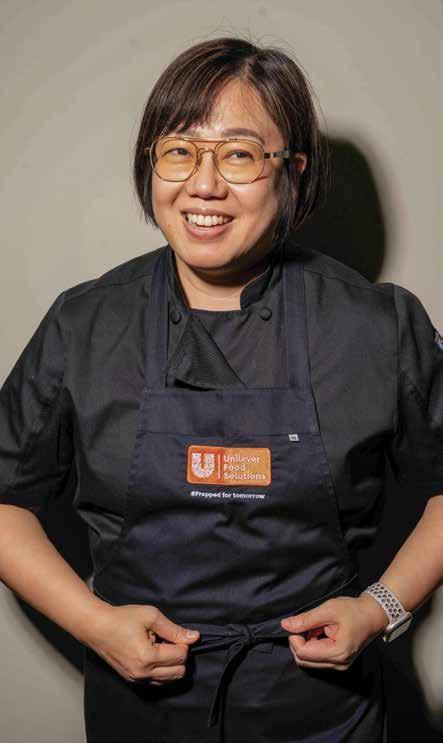
confident that you are right. But I have learned that the first and hardest step is to simply listen.
Hear the person out first, understand where they are coming from, and resist the urge to correct and defend immediately. I try my best to keep the discussion grounded in facts. Actual situations, not hearsay. And I asked the person to walk me through what was going through their mind at that time. That opens the door for honest reflection.
From there, it is all about balanceoffering actionable support, both in the short and long term, while holding the other person accountable. It is essential to ask, "What changes do YOU need to make for now and moving forward?" Hopefully, that shared ownership will eventually help build trust and growth.
You have mentored many chefs throughout your career. What advice do you find yourself giving most often? And what do you wish
someone had told you when you were starting out?
The advice I often give is…
On teams – Build a strong team and surround yourself with the right people, those who uplift, support, and help you deliver the results together. In the kitchen, no one succeeds alone. We win or lose as a team; having a solid team dynamic makes a whole lot of difference.
On self - To keep an open mind. The F&B world is rapidly evolving, and bright ideas come in all shapes, sources, and forms. To stay relevant, you must be willing to adapt and collaborate – all while remaining true to your core values.
When I was starting out, I received my promotions quickly compared to industry standards, which wasn't universally appreciated. A senior chef told me, "Filter through the noise – stay focused and let your work and not your mouth do the talking." That has always stuck with me over time.
Looking back, I wish someone had taught me how to manage my emotions more effectively. I am very passionate about my job and my trade; this has been a strength and a challenge. Learning to channel that passion constructively, especially under pressure and when working with people who feel differently, was something I had to figure out along the way.
If you walked into a kitchen and sensed it was fair, what would you see, hear, and feel? What are the signals that a positive culture is in place? There would be a strong sense of collaboration. Even if the pressure of a job is high, people are working with each other, not just next to each other. You would see diversity yet feel the teamwork and mutual respect. There is a palpable shared energy that everyone is pushing or pulling in the same direction.
You will also get to feel that sense of ownership. That the team is not just
The mindset shift is crucial: lead not as a female leader, but simply as a good one
doing the task, but genuinely cares for the success of the business.
There is often a tension between compassion and high performance in professional kitchens. How can Fair Kitchens help chefs manage both without losing focus?
Fair Kitchens manages the balance between compassion and high performance by grounding everyone in a clear and shared vision. It is essential that teams understand that while well-being and support are prioritized, the business needs to thrive. And with consistently high performance, this allows the business to grow and provide opportunities for everyone.
One of the most important things I have learned from working at Unilever is the importance of clarity and alignment. When people know that both care and excellence are expected, they will step up and rise to the occasion.
A strong reward system can also make a difference - one that not only recognizes individual performance but also rewards good leadership, collaboration, and coaching to build stronger teams. Compassion and performance, when managed well, can definitely fuel each other to make a successful organization.
Achieving gender balance in kitchens remains a work in progress. What do you think are the most effective ways leaders can create space for more women to thrive in senior culinary roles?
Visible representation – It is not
just about women leaders within the organization, but also bringing in perspectives from female leaders in other establishments or related industries. Their experience can offer a broader view that can inspire new ways of thinking and leading.
Systems in place to support their growth – flexible working models, daycare incentives for working mothers, leadership training programs that are tailored fit for women.
Creating a culture that is defined by performance, not gender.
Male mentors – those who can help normalize female leadership
What does real inclusion look like to you, not just in hiring more women, but in how kitchens operate day to day? In a truly inclusive kitchen, roles are assigned based on skill and potential rather than assumptions. There should be equal access to learning and leadership development. Inclusion should also be evident in small, daily actions: who gets mentored, who gets the tough assignments, who gets to create the specials or run service, or who leads a tasting session.
It is about having the right work environment where people are heard equally & feel safe to contribute without judgment or bias.
FairKitchens promotes healthier work environments. What is one thing you believe head chefs should stop doing and one thing they should start?
One thing chefs should stop doing is contributing to or tolerating toxic behavior in the kitchen. Disrespecting others has no place in a modern professional environment. Respect should not be tied to rank. Every person in the kitchen, from the steward to the chef, deserves to be treated with dignity.
What chefs should do more of is to lead by example. Creating a culture of respect and collaboration while still expecting excellent performance. One can set high standards without creating fear. ■
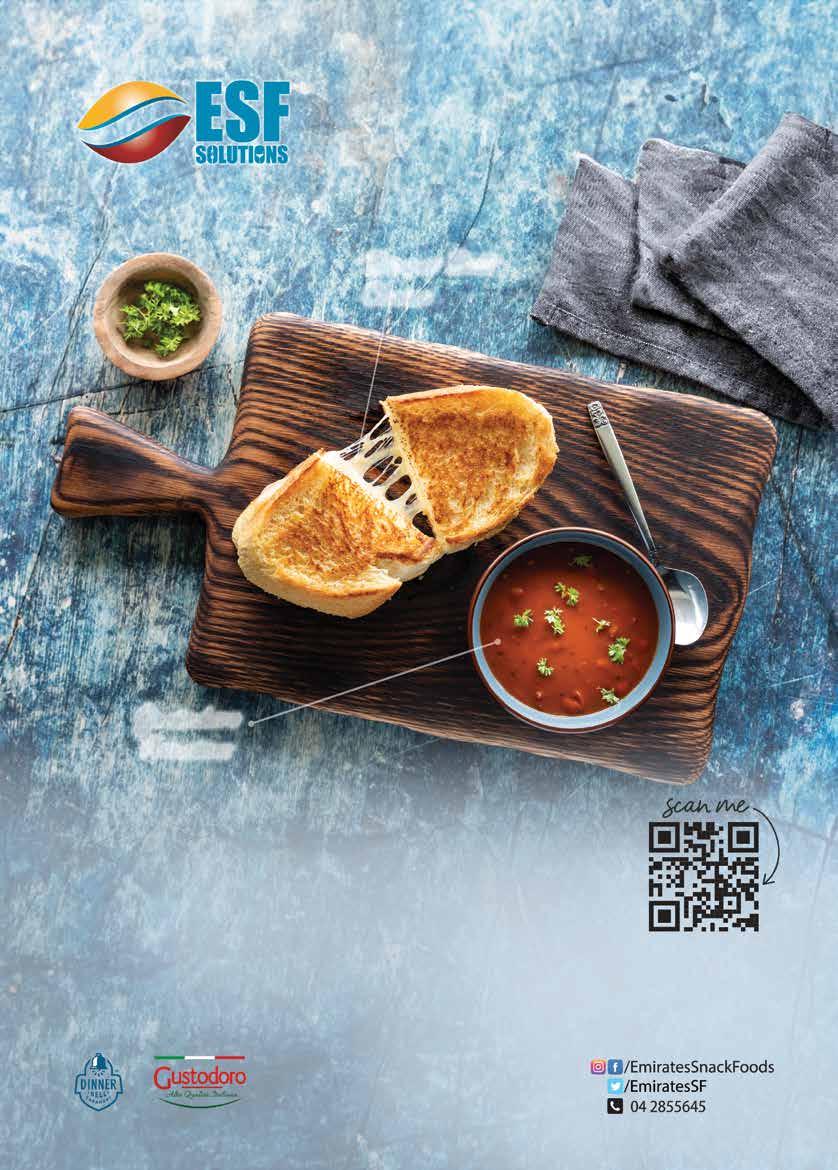

Chef Soul Abouzahr on the messy, beautiful reality of being a working mom in a high-heat culinary industry, and why she would not trade it for anything
Being a mom is a full-time job. Being a chef is another. Now add to that running your own business, working full-time as a culinary educator, and hosting TV cooking shows, and you have got my life in a nutshell. It is exhilarating, exhausting, chaotic, beautiful, and absolutely worth every second.
I am a mom to a spirited six-year-old boy who lights up my world, a wife to a supportive partner, and a woman who is fiercely passionate about food, family, and ambition. Most days, I am juggling school pickups with supplier meetings, homework with recipe development, and filming with planning dinner. It is not easy, but I would not trade it for anything.
The Double Shift People often ask me, "How do you do it all?" The truth is, I do not do it all. Not perfectly, anyway. Some days I crush it. Other days, I forget the water bottle for school or miss a call because I am elbow-deep in dough. The key is not balance, it is flow. I have learned to move between roles fluidly. In the morning, I might be prepping lessons for my culinary students while packing my son's lunch. By afternoon, I am either filming a cooking segment or meeting clients for my business. Come evening, I am home helping with homework, cooking dinner, handling bedtime, and if I am lucky, squeezing in a bit of me-time with a cup of coffee or a call with my parents.
Motherhood does not pause for work, and work does not pause for motherhood. So, I have stopped trying to separate them. They overlap,
Motherhood does not pause for work, and work does not pause for motherhood
intertwine, and sometimes collide. That is okay. That is life. My life.
Chef, Boss, Educator, Mom
Being a chef is not just a career; it is a calling. The kitchen is my creative space, my battlefield, my sanctuary. It is where I feel most alive. But it is also a space that demands intensity — physically, mentally, emotionally, and running a business on top of that? It is not glamorous. It's logistics, budgeting, staff management, client relations, and endless decision-making. Now sprinkle in teaching, where I give my all to inspire and educate future chefs, and you start to see the whole picture.
There are days when I go straight from a classroom to a production set, then rush to school to pick up my son in full makeup because I forgot to get it removed. There are nights I stay up late finalizing menus, prepping for shoots, or responding to emails, all while trying to remember if we have clean PE clothes for the next day. This is the real behind-the-scenes.
But there is magic in this madness. When my son watches me on TV or sees me commanding a kitchen, he is learning
what strength and passion look like. He is seeing firsthand that women can lead, create, nurture, and thrive; all at once.
And nothing fills my heart with more pride than when he looks at me and says, "Mommy, I want to be a chef like you one day." In that moment, I knew it was all worth it. I know I am leaving him a legacy built not just on recipes, but on courage, commitment, and love.
The Heart at Home
Home is where I recharge. It is where I am just 'Mom,' the one who gives the best hugs, makes the fluffiest pancakes, and knows how to turn a regular Tuesday into a kitchen dance party.
And I have to say that I am fortunate to have a husband who is truly my partner in every sense of the word. He has been my cheerleader, my sounding board, my calm in the storm. Whether it is handling the school run, giving me space to prep for a shoot, or simply reminding me that I am doing great on the days I feel like I am failing, he is there. I know that not every woman has that support, and I never take it for granted.
We all need at least one person who believes in us. One person who sees what we are capable of, even on the days we do not see it ourselves. My husband has been that person for me. And together, we are trying to raise a son who knows the value of hard work, compassion, and dreaming big.
The Myth of Perfection
If there is one thing I have learned, it is to let go of perfection. The perfect mom,
August-September 2025 Gulf
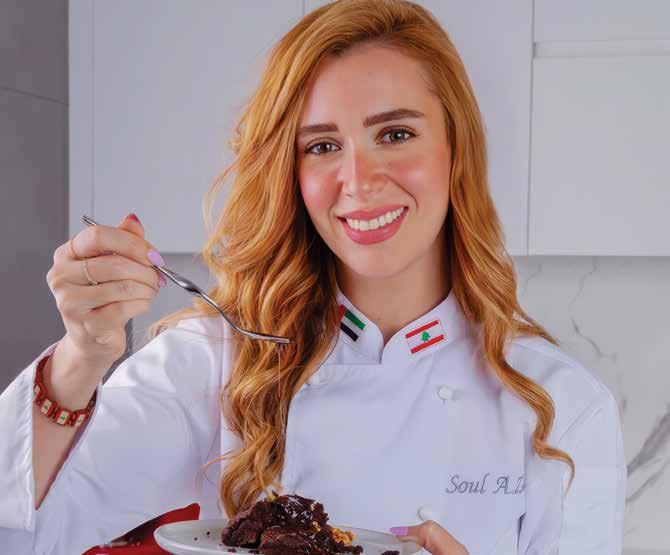
the perfect wife, the perfect business owner, she does not exist. I show up as best as I can, every day. I make mistakes. I burn toast. I double-book appointments. I cry from exhaustion. But I also laugh from the belly, love fiercely, and get back up every single time.
My life is not curated; it is real. It is messy and loud and full of flavor, just like the food I cook. And that is what makes it beautiful.
Building the Future I Want
I did not grow up seeing many women who looked like me leading kitchens, running their businesses, or being on TV. So I decided to become that woman, for myself, for my son, and for every girl watching who needs to know she can be everything she wants to be.
I want to create a legacy of strength, creativity, and love. Not just through the food I make, but through the life I live.
We are breaking barriers every time we show up authentically in all our roles
I want my son to grow up knowing that ambition is not something to fear, that love is not limited by gender roles, and that a woman's place is wherever she wants to be, the boardroom, the kitchen, the playground, or the red carpet.
We Are Breaking Barriers, One Plate at a Time
To all the chef moms out there, I see you. The ones prepping meals with a baby on their hip. The ones teaching, cooking,
managing, loving, and leading, all in a single day. You are not just surviving, you are thriving. We are breaking down barriers every time we show up authentically in all our roles.
This life we have chosen is not easy, but it is powerful. We are showing the world that motherhood is not a setback; it is a superpower. That women can raise children and raise businesses. That we can run homes and run empires. That we can wear aprons and heels and still command respect in any room we walk into.
We are not just cooking meals, we are cooking up change. And trust me, it is delicious.
Chef Soul Abouzahr is a Lebanese Canadian Chef, award winner, TV personality, and culinary educator, passionate about teaching practical skills and inspiring confidence in the kitchen and on social media



30 SEP - 2 OCT 2025
Madinat Jumeirah, Madinat Arena | 3 - 9 pm



Food Stylist Henriett Braun on what it means to go against tradition, break expectations, and listen to your inner voice
Coming from a co-ed environment in Hungary, I never really considered whether women or men held more power. Throughout my life, I set goals and pursued them based on my personal desires, without dwelling on the fact that I am a woman or the challenges that might come with it. So, when tasked with writing this article, I found it to be a thought-provoking question, simply because I had never truly given it much thought in the past.
However, after moving to the UAE, I began to realize that not everyone comes from the same privileged background of having the freedom to pursue their goals without limitations. I soon saw that everyone, regardless of cultural or religious background, must go through a personal transformation to break free from the boundaries set by their upbringing, societal expectations, or traditional norms. This shift is deeply personal and sometimes painful, but necessary for growth.
I'm not doing what I was raised or trained to do. I went against what I studied for. I chose food styling based on a deep desire to express myself through art and connect with people by bringing out the beauty in a dish. I studied at a school in Hungary with an English major and later pursued marketing at university, which led me into the corporate world for several years. But over time, I began to burn out. The structure of corporate life felt too rigid, and I yearned for something more creative and fulfilling.
That is when I discovered food styling. Initially, I admired chefs for their

intense, hands-on craft, many working up to 14-16-hour days. I did not think I could manage that. But I quickly learned that food stylists can also work 16- or even 20-hour days. The difference? At least we get a break, and the creativity makes it worthwhile.
Not many people know this, but I had 16 different jobs before I discovered food styling. Through all those roles, I often felt like the problem was with me. I did not seem to belong anywhere. After a
I’m not doing what I was raised or trained to do. I went against what I studied for
year and a half of soul-searching, I finally realized the real issue: I had not yet found the right fit, the right path.
Throughout this journey, my family stood by me, even if they did not always understand my choices. Their quiet support gave me the space to explore and eventually thrive.
Reflecting on this, it is clear that finding your true calling is not easy, especially for women. Often, it means going against tradition, breaking expectations, and listening to your inner voice. Empowerment begins with permission, the permission we give ourselves to try, fail, change, and grow.
In a world that still asks women to fit into molds, choosing an unconventional path like entrepreneurship or a creative profession takes courage and community. That is why support networks matter. In the UAE, I have seen women succeed through the strength of family, friendships, and the growing solidarity among women entrepreneurs. Especially in industries like food styling, where creativity knows no boundaries, women are not just making a mark, they are breaking them. ■
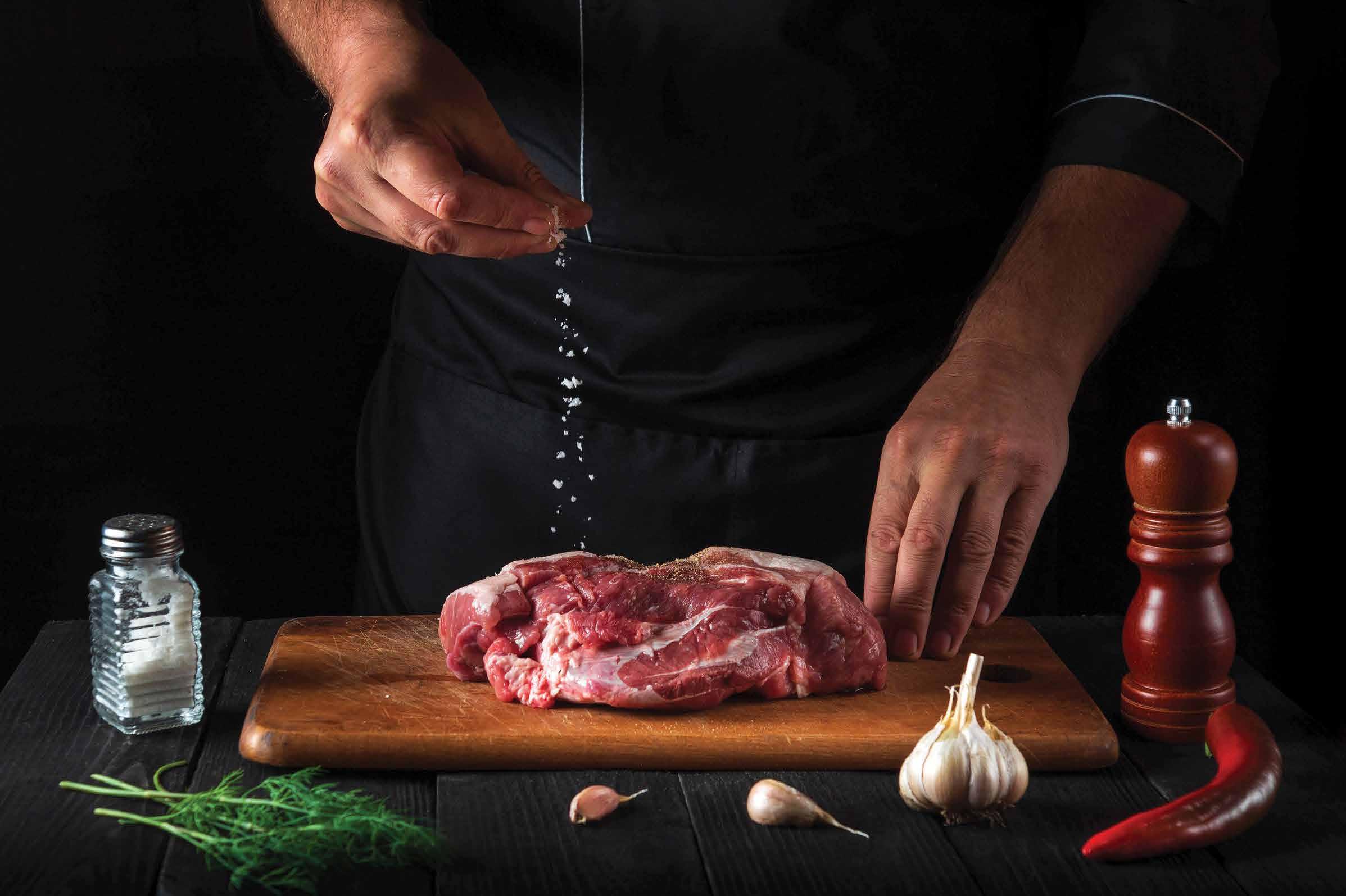


emotional contexts. Even in television and food magazines, there remains a tendency to highlight a woman’s appearance or personal life rather than her culinary skill or leadership.
Despite these challenges, women continue to reshape the industry. Female chefs are proving that strength, resilience, and creativity are not bound by gender. They are bringing a fresh perspective to food; one that values collaboration over hierarchy, intuition alongside technique, and sustainability alongside success.
strength, resilience, not bound by gender
career will eventually take a backseat to
The long hours and unpredictable schedules in hospitality are seen as incompatible with motherhood or caregiving, and women are sometimes passed over with the assumption they would not 'commit long-term.' These outdated views ignore the many women who balance successful careers and families, often with less support than
The media adds another layer. Male chefs are frequently portrayed as rock stars or innovators, while female chefs are too often framed within domestic or
To create lasting change, the industry needs systemic reform. This includes equal opportunities for mentorship, fair pay, flexible work environments, and zero tolerance for harassment or discrimination. Most importantly, it involves breaking the silence around bias and actively challenging the stereotypes that keep women out of the spotlight.
When women are empowered to lead and shape food culture, everyone benefits. Diversity in the kitchen leads to Richer menus, Stronger teams, and a more inclusive dining experience. It is time to move beyond the outdated notion that the chef’s jacket is made for one gender.
The future of food is diverse, collaborative, and bold, and female chefs are rightfully claiming their place at the center of it.
Delmé Jacobs is an Executive Chef specializing in innovative menu development and culinary concept creation. Experienced in private households, passionate about healthfocused cuisine, and driven by wellness and guest satisfaction.


David Sprakes, the Creative Director at Ronai, talks to Gulf Gourmet about the concept behind Shefwear, the numerous iterations it took from sketch to final stitch, and the beauty of creating a uniform that is both flattering and functional for women chefs in the industry
Some conversations in the culinary world seem to be on a loop. Dialogue around representation, diversity, and identity in professional kitchens often surfaces in op-eds and social media storms. The debate around what women wear in the kitchen is no exception. Somewhere between oversized jackets and shrink-it-and-pink-it solutions, the uniform for female chefs has long been an afterthought.
And then few stand apart quite like David Sprakes, who is not interested in tossing another version of the same tired design into the pile but creates fashion as a medium of rippling change through the industry.
David is at the helm of fashion and the culinary world as Creative Director of Ronai, a leading uniform brand based in the UAE. And if you want to understand David, all you need to do is look behind his desk.
His workspace backdrop is a riot of color, patterns, and texture that refuses to play by the rules. Patterns clash and coexist, cluttered in the most curated way. "I am an agent of chaos," he says with a slight shrug and a lopsided grin.
It is where he finds inspiration. He has made peace with unpredictability and, rather than resisting it, treats it as de rigueur.
Challenges do not faze him. So when asked to design a uniform for a fictional character, he smiles again and says, "It has got to be Doctor Who," and you
can tell the idea has already started spiralling in his mind.
He pictures a kitchen inside the TARDIS, imagining a different jacket for each incarnation of the Doctor. "They have all got such different personalities; it would be amazing to design for each version."
And that is the thread running through all his work; even in imaginary worlds, he is thinking about people's comfort, that they have a uniform they can connect with. Not one-size-fits-all, but one-size-fits-you.
Even after decades in the fashion industry, there is something disarmingly unfiltered about him. His eyes light up like a child who never stopped sketching. "I always knew I wanted to work in the arts and design. Like many in the 90s, I went through my education and earned my degree in fashion and textile design. From there, it all snowballed, and I spent nine years working in the UK for international businesses on corporate wear and uniforms," he recalls.
A few years later, he joined forces with Ronai. Having launched their first chef catalog a couple of years earlier, they had already begun to tread the waters of the chef wear market by selling established brands. By that point, they were inundated with custom requests, prompting them to create their line of chef wear, designed with inclusivity at its core.
The first time Shefwear came to David was in a room full of honest conversation. It all began last year at the monthly Emirates
Design is not just about aesthetics; it is about people feeling confident and see
Culinary Guild meeting, when David met Chef Tarryn-Leigh Green and several members of the Guild's Women Culinary Chapter. What followed was an earnest deliberation on the noticeable shift in the culinary industry toward greater equity and diversity in hiring practices.
During several ECG meetings, Chef TarrynLeigh Green listened to Ronai present their take on adapting chef uniforms for women, typically by shortening sleeves or offering alternative colour options. She recalls sitting there, wearing a Ronai jacket herself, feeling incredibly selfconscious and uncomfortable. "It struck me that throughout my career, I had never worn a uniform that truly fit me. I was either drowning in oversized jackets, some reaching down to my knees, or struggling with uniforms that were too tight in the wrong places because my hourglass shape didn't align with the standard, straight-cut designs," says Chef Tarryn.
In that moment of inquisitiveness, she approached David with a vision for a womenswear range that fit correctly and considered inclusivity, particularly for women with religious modesty requirements. "I was fortunate that David immediately saw the value in the idea," she adds.
David recalls the meeting as illuminating, leaving him with a long list of ideas to consider and translate into practical design. "It is not just a male jacket that has been refitted, but the creation of a femalefocused chef jacket from scratch. This was our chance to address what is happening in the industry and support those involved as it gains ground," explains David.

#Picture 1
The design process stretched over six months. David and his team started with one jacket, testing lines, silhouettes, contours, and proportions. Lines were drawn, erased, and redrawn. The first version did not sit right, the fastening line cut too low, so they raised for an ideal sweep across the body.
The team shaped and reshaped the jacket. One version experimented with internal and external ties; another featured a concealed fastening. Sleeve lengths were adjusted, shortened, and widened, taking into account the placement of concealed pockets. At the same time, they developed maternity versions, custom-made pieces in response to special requests.
"It had to balance aesthetics with the look of the venue and branding, as well as the functionality and comfort of the wearer. The challenge is to create a uniform that can be industrially laundered. We need a female jacket that is both flattering and adaptable for different body shapes. We also have to keep cost in mind. I could design an absolutely beautiful jacket, but if it ends up costing a thousand dollars, no one will buy it," he says, without losing his thread of thought.

#Picture 2
One of the most frequent requests he received was for pockets. But pockets, as simple as they sound, are determined on broader uniform policies of the workplace. Still, for independent chefs or those with their own brands, personal touches matter. Therefore, the team added a concealed welt pocket, subtle enough to comply with uniform policies but functional for those who need it.

#Picture 3
"We also offer the option of a side tie fastening, with or without. Some chefs
do not remain solely in the kitchen; they move between meetings, desks, and service. The side seam makes it more comfortable to sit, but it also provides a better fit for different body types," David explains.
#Picture 4
Yet another detail carefully considered was the neckline. A beautiful architectural logic to this collar and the way the seams wrap, it maintains the classic stand collar style, an element of the chef's jacket that dates back to the early culinary movements of France. Explaining the references, David adds, "Our goal is to take a classic design and mold it into something practical and demure. It is still professional-looking, with no plunging neckline, but also flattering."
#Picture 5
Moving from form to fabric, the decision for polycotton was reached after weighing practicality, cost-effectiveness, longevity, and comfort. Polyester

adds durability, helping the uniform withstand industrial laundering and resist creasing, and cotton adds softness and breathability.
"The fabric suppliers we work with have put a lot of effort into their sustainability messaging in recent years. If they are working with cotton, then they work with growers
who practice sustainable farming without harmful chemicals. The yarns are processed in mills that follow sustainability practices, reducing water usage and using solar energy to supplement their power needs. They also uphold ethical practices, which means no child labor, fair wages, operating entirely on ethical and sustainable practices," he notes.




#Picture 7
Recognising that culture and geography are among the many ways a design can adapt to serve different needs and take on meaning David has an intuitive grasp
of this. He has also created another version of jacket called the 'modesty jacket,' designed for wearers who wear hijabs or prefer a higher neckline. It is boxier, less contoured, and maintains a professional look without sacrificing comfort or femininity.
#Picture 8
Sharing his vision for the future, he plans to continue expanding the Shefwear line over the coming months and witness people feel confident and seen in what they wear.
"So much has changed in the design and fashion industry over the last 30 years," notes David. "And we have to stay mindful; every garment we develop must consider everyone who will wear it. Even with Shefwear, it all started with feedback, understanding what the client's would need. It is a symbiotic relationship. From design through to fabric, manufacturers are always coming up with new ideas because of feedback." ■ 8

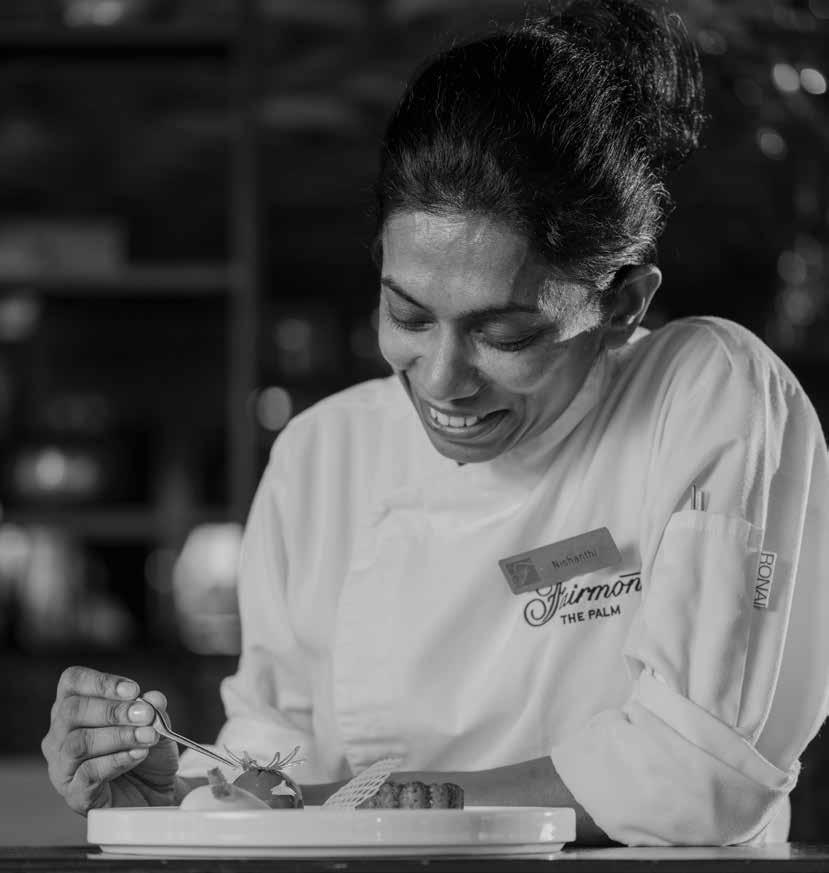
A career that was not the plan, but became the purpose. This is more than the story of how a Station Master’s daughter found her way into the pastry world. It is the tale of Chef Nishanti finding her passion through practice, a father’s gentle nudge, a bit of happenstance, and a path she made her own
She did not always dream of becoming a chef. In fact, growing up in Matale, a city in Sri Lanka, in a family where her father worked as a government railway station master, a more conventional future seemed expected rather than a step to untangle the web of culinary arts.
It was during one of those moves, when her father was posted in Bandarawela, that he befriended the principal of the Sri Lanka Institute of Tourism and Hotel Management. The idea of a future in pastry felt, at the time, entirely incongruous with everything she knew.
“At the time, I had just finished my A-levels and was waiting for results. I wasn’t interested in hotel school at all. My English was weak, and I was only focused on maths and accounts. I thought I would become a teacher or a government officer, ”she says.
But life, unpredictable as ever, took a detour. Before long, hotel school was on the table. “My father suggested I join the four-year course and study housekeeping, F&B, or cooking. It wasn’t exactly love at first sight. But slowly, I started to enjoy it,” she admits.
Standing her ground in a real kitchen came the hard way through hands-on training that tested her limits. “ I still remember when I did my training at a hotel in Colombo, and I was handed heaps of onions and garlic to prepare. I panicked. I had no idea what to do, and I just ran away.”
Shortly after, the principal called her father. “ He explained to him that if your daughter doesn’t finish this internship, she won’t be able to complete her hotel school program.” It was a wake-up call, a moment that made her realize the culinary world demanded a different kind of toughness.
“I cried. But I went back,” she says. What began as fear eventually turned into grit, and it laid the foundation for a work ethic that would only grow stronger
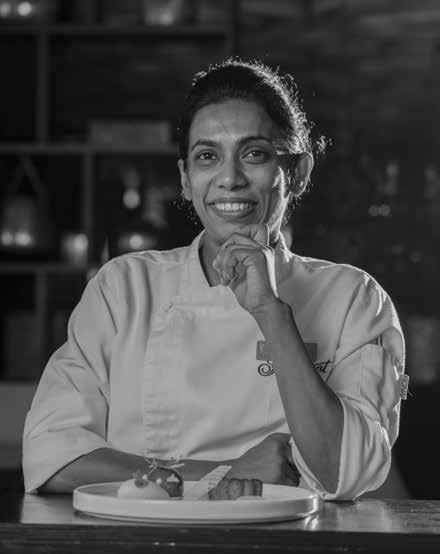
It wasn’t exactly love at first sight. But slowly, I started to enjoy it
with every challenge she faced in the hospitality industry.
“ I took on different roles in this field, working in both the front of the house and back of the house to understand the full picture and stand on my own feet,” she explains, recalling how those early experiences planted the seed of her inclination toward taking the management route and one day becoming a general manager.
By the age of 25, she took a leap and moved to Dubai to pursue a course in
hospitality management. But once in Dubai, her plans began to shift, and instead, she found herself stepping into her first official kitchen role as a Commis III at Media Rotana. It wasn't the path she had originally envisioned, but it became the one she loved.
A year later, she joined the Dubai International Hotel, developing real confidence and sharpening her leadership skills along the way. From there, her career took on a steady upward arc. She went on to sharpen her skills at properties including Crowne Plaza Hotel, Deira, Le Meridien Hotel and Conference Centre. The days were long, early starts, late finishes, and festive seasons brought pressure in the form of nonstop service.
“ I also got the opportunity to work for the new opening of Novotel Hotel, Suites, and Resorts as a chef de partie. I learned a lot from running the buffet alone, assisting the team with pastry
and within three months, I received a certificate for my efforts within three months of joining the team.”
Then came the pandemic. Like many in the industry, she faced a period of uncertainty and tested patience after losing her job. But with the support of mentors and former colleagues, she regained her footing when an opportunity opened up at Fairmont The Palm.
"I promised myself I would do the job properly because behind every opportunity I've had, there's been a long journey of learning and incredible support," she says. She considers herself fortunate to have been guided by people who truly believed in her, including Stéphanie Erit, Director of People & Culture at Fairmont, Executive Sous Chef Anup, and Pastry Chef Rajesh at Fairmont The Palm, and from the Pullman Hotel, GM Nishan Silva, HR Director Mary Ann, and Chef Dammika.
" I learned so much from them and other mentors, including the Director of Culinary, Darren Andow, Executive Pastry Chef Siddhesh, Chef Anil, and Chef Karol. I'd also like to extend a special thank you to Chef Uwe, who not only helped me like a father but also supported me in obtaining my ICCA pastry diploma
Behind every opportunity I’ve had, there’s been a long journey of learning and incredible support
through a scholarship. I am also grateful to Mrs. Shanaaz and and Mr. Sunjeh From ICCA for their support."
It has been nearly four years since she started working at the Fairmont The Palm.“When I first joined, I was a Demi Chef, working in the cake shop, where I developed skills in garnishing and detailing. Over time, I was promoted and moved to production. We have a large team in production,” she says. “Each outlet has its own requirements, so we divide duties to keep things running smoothly.”
Production, as she puts it, is more about consistency, discipline, and efficiency. " We need to focus on the flavors and combinations, as well as the finishing touches, to attract customers. "
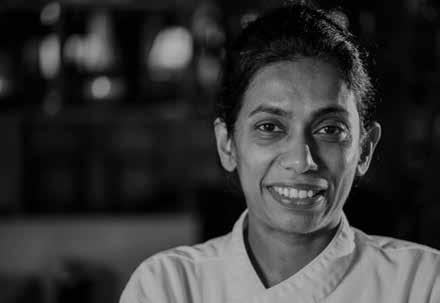
Ask her what she enjoys most, the creativity in cakes or the structure of production, and she remarks, “No doubt, I love finishing and garnishing. The design and detail are what drew me to pastry in the first place.”
As much as the cake shop nurtures her creativity, production sharpens her consistency and speed. “ If you want to be a good pastry chef, you need to master both.”
But behind that balance lies another steady force. One of her family members is her husband, Hillary Joseph, who is a seasoned chef himself.
Sharing her love story, she cues up the time when they first crossed paths during her internship at Holiday Inn. Hillary was a Demi Chef there, and one day, he finally built up the courage to talk to her about seeing a future together. “I told him that if he is serious, then he should ask my father first. Because he’s my hero.”
Chef Hillary took her words to heart. One day, he went directly to her father. “My father called me while I was at the cinema with my sister. He said, ‘Come home quickly.’ I had no idea what was going on,” she says, smiling. “When I got there, Joseph was standing in front of my father, asking for permission.”
“I didn’t say yes immediately,” she admits. “I still had to finish my hotel management course, and we both had to be in a good position in our work. But that was our little story,” she smiles with nostalgic joy.
What was once a hazy dream of hotel management, as the clouds cleared, mastering pastry stood in full view. “I want to become an executive pastry chef one day,” she says affirmatively.
Chef Nishanti has ticked many boxes in her culinary career. Her story, peppered with moments of doubt and epiphanies, conveys that sometimes the dreams we never plan for are the ones that suit us best.
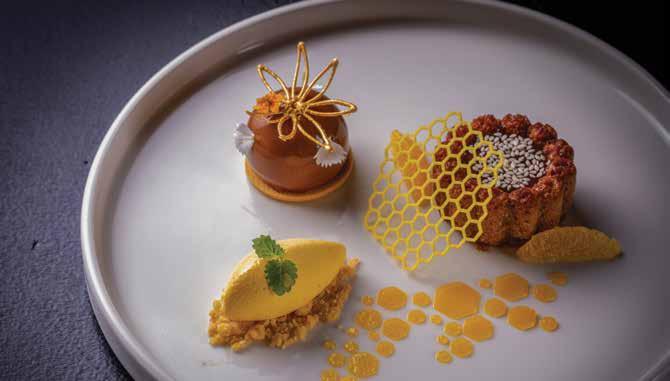
Passion Mousse and Iced Mango Cheese with Mango Jelly
Honey Cake
Water
375g
Butter 88g
Cream 300g
Honey 125g
Flour 88g
Baking Powder 7g
Baking Soda 7g
Sugar 113g
Browne Sugar 150g
Tea Bag 6nos
Egg Yolk 50g
Egg White 88g
Method
Boil the water and add a tea bag. Set it aside to cool.
Use the creaming method for butter, sugar, brown sugar, and honey. Add egg whole and egg yolk. Strain the tea bags and add to the mixture. Rest the mixture for four hours in the chiller and bake at 140°C for 25-30 minutes.
Saffron Tuille
Butter 175g
Icing sugar 175g
Egg white 140g
Flour 163g
Saffron 2g
Method
Use the creaming method: combine butter and icing sugar, then add egg whites, followed by flour and saffron.
Honey Orange Nectar
Honey 200g
Orange juice 100g Method
Honey and orange juice mix together.
Caramelize Banana
Passion Mousse
Passion Puree 60g
Banana Puree 340g
Egg White 80g
Sugar 80g
Glucose 15g
Water 35ml
Whipped Cream 225g
Gelatin 14g Method
Heat the passion puree and banana puree, and add the soaked gelatin.
Place the egg white in the machine bowl and heat until 120°C. Add, add sugar, glucose, and water, then puree the mixture with the egg white. Fold in ththee passion and banana mix, then fold in the whipped cream.
Sable Base
Sugar
280g
Butter 300g
Egg Yolk 120g
Flour 400g
Baking Powder
40g
Salt 8g Method
Mix the butter and sugar using the creamy method, then add the egg yolk.
Then add dry ingredients, flour, baking powder, and salt.
Iced Mango Cheese
Cream Cheese
100g
Mango Puree 75g
Sugar 50g Method
Mix the cream cheese, mango puree, and sugar, then put them in espumas and keep it in the chiller for four hours before use.
Almond Crumble
Flour
10g
Sugar 100g
Almond powder 100g
Butter 100g Method
Mix it altogether until crumble then bake them until golden.
Mango Jelly
Mango Puree
Sugar
200g
50g
Agar Agar 4g Method
Boil the mango puree with 40g of sugar.
Add 10g sugar and agar agar, then cook, and place in the freezer until set. Blend it before use. ■
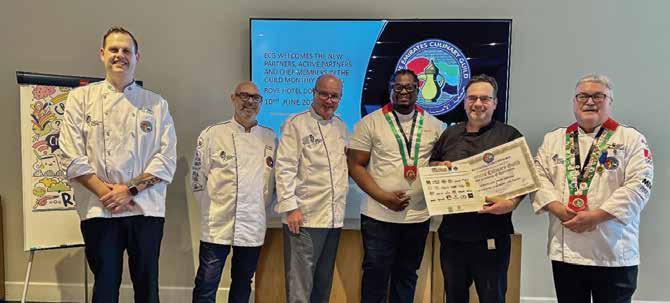
The June guild meeting was held at the Rove Hotel, Downtown Dubai — many thanks to Chef Spencer Black for hosting the event.
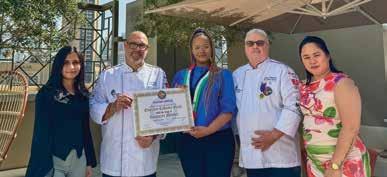
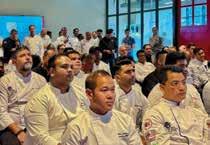
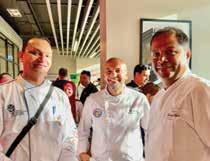
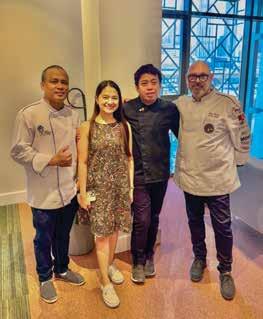
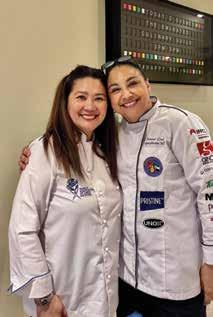
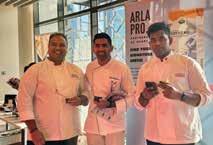
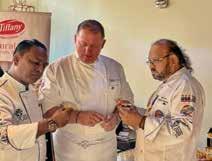
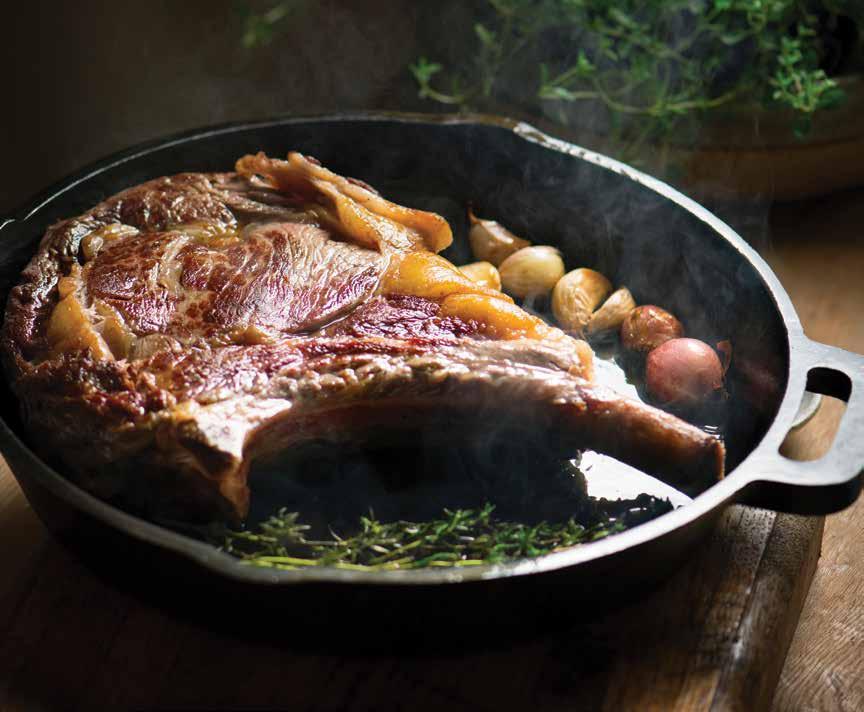


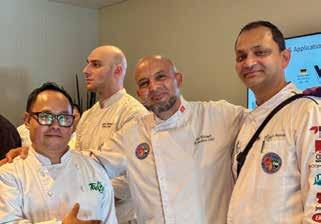

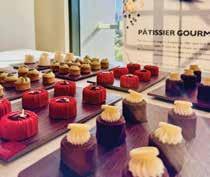

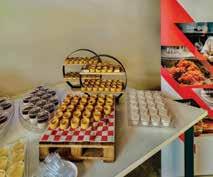
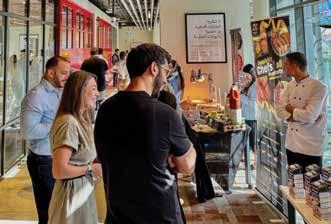
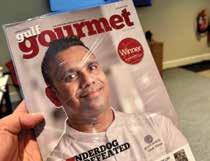
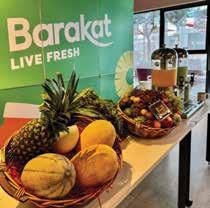
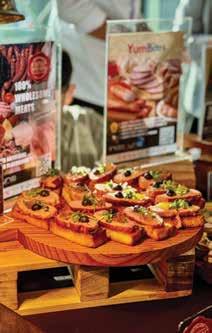

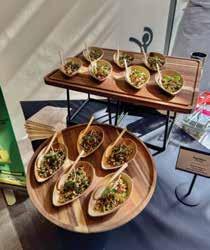




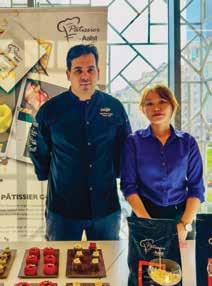
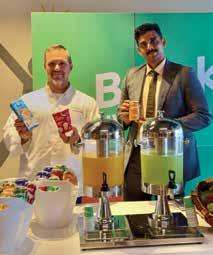

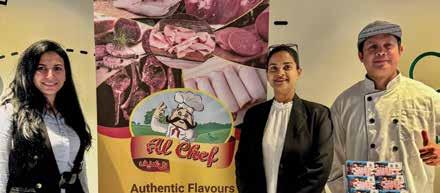

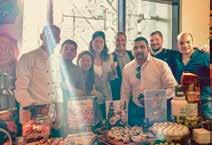
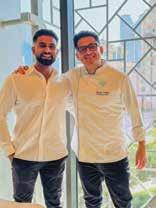
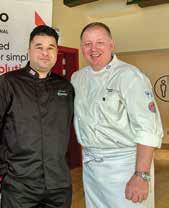
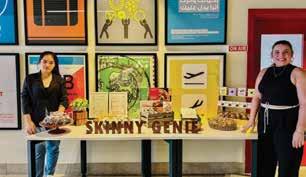

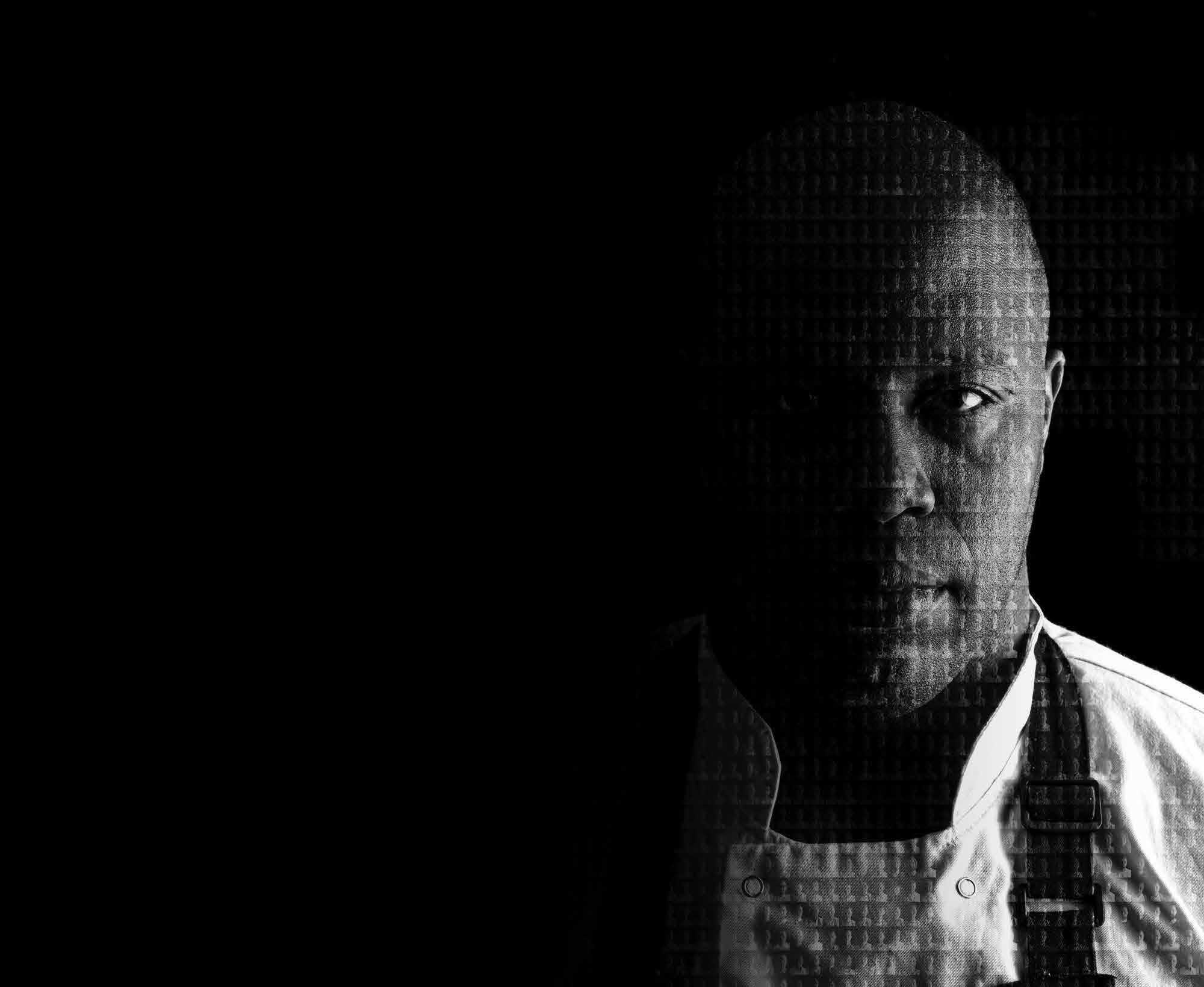





August-September 2025 Gulf Gourmet

Agthia Group PJSC
Sasha Kannan, Category Development Manager Tel: +971 56 177 87 86, sasha.kannan@agthia.com, www.agthia.com
Al Chef
Ranin Bakhitt, Marketing Manager
Tel: +971 4 357 0320, Mob: +971 50 687 0224 ranin.b@alwholesale.ae, www.alcheftohome.com
Al Wholesale
Ranin Bakhitt, Trade Marketing Manager, Mob: +971 50 6870 224, ranin.b@alwholesale.ae, www.alwholesale.ae
Alaska Seafood Marketing Institute (ASMI)
Manjusha Jambhekar, Overseas Marketing Representative – MENAWA, Tel: +971 4 357 7979, Mob: +971 55 5333740 manjusha.m@focusmworld.com, www.alaskaseafood.org
Alliance Abroad International
Zama Nkabinde, Talent Acquisition Manager, Mob: +971 52 2339 779, znkabinde@allianceabroad.com, www.allianceabroad.com
Alto Shaam, Inc
Gabriel Estrella Talentti, Director of Sales, Tel: +971 4 321 9712, Mob: + 971 50 8531 707 gabriele@alto-shaam.com, www.alto-shaam.com
Americana Foods
Laurent Stevenart, Plant Based Food Director, Mob: +971 52 1354 732, lstevenart@americana-food.com, www.americanafoods.com
Arab Marketing and Finance, Inc. (AMFI) Simon Bakht Tel: +961-1-740378 / 741223 / 751262 SBakht@amfime.com
Arla Foods
Rachna Amarnani, Marketing Specialist, raamy@arlafoods.com, B7 Building Digital park - Dubai Silicon Oasis - Industrial Area - Dubai www.ArlaPro.com, www.arlafoods.com
Bakemart FZ LLC
Syed Masood, Director of Sales Mob : +971 55 609 7526, Tel: +971 4 56708 masood@bakemart.ae, www.bakemart.ae
Barakat Group of Company
Kenneth D’Costa, Managing Director Neil Ranasinghe, Head Culinary Innovation Tel: +971 4 8802121
Del Monte Foods (U.A.E) FZE
Hany Shamseldeen, Mob +971 50 146 7400, hali@freshdelmonte.com, me.freshdelmonte.com
Diamond Meat Processing Co.L.L.C
Kamparath Suresh, Assistant General Manager Business Development, Mob: +971 50 655 4768 wnedal@siniorafood.com, www.almasadubai.com
dmg events
Hassan, Tel: +971 4 4380355, Mob: +971 56 8360993, aysehassan@dmgeventsme.com, www.thehotelshow.com
Emirates Snack Foods
Marwan Husseini / Vincent Lobo, Head of Sales – Food Service / Creative Head Mob: +971 56 5267 181, +971 55 3692 344 marwan.husseini@esf-uae.com vincent@esf-uae.com, www.esf-uae.com
Essity Hygiene and Health AB
Ozge Osmanoglu, Customer Marketing Activation Manager MEIA, Mob: +971 52 7571 486 ozge.osmanoglu@essity.com, www.torkmeia.com
Faisal Al Nusif Trading Co. L.L.C
Thomas Das, Managing Director Tel: 04 3391149, thomasdas@fantco.net, Web: www.fantco.net
Farm Fresh
Feeroz Hasan, Business Development Manager Al Quoz, P.O Box 118351, Dubai, UAE Office No : +971 4 3397279 Ext: 253 Fax: +971 4 3397262, Mob: +971 56 1750883
Farzana
Fariborz Kadem, Head of Food Service, Mob: +971 55 8846 293, Tel: +971 4 3200 101, fariborz@farzana.com, www.farzana.com
Flora Professional
Marwan Abidaoud, Jean Lteif, Ronica Sanchez, Nadia Lagdah, Neelam Karim, Regional Lead Culinary Chef - AMET, Culinary Chef UAE & QBOK, Food Service Sales Manager, Head of Marketing, Senior Brand Manager, Mob: +971 50 796 6264, +971 52 829 9891, +971 58 233 1463, +971 50 290 3820, +971 53 369 4190 marwan.abidaoud@florafg.com, jean.lteif@florafg.com, ronica.sanchez@florafg.com, Nadia.Lagdah@florafg.com, neelam.karim@florafg.com
FSEP Catering Equipment Trading LLC
Shivani Rawat, Office Manager Tel: +971 4 8851 610 info@fseprof.com, www.fseprof.com
German Icecream Factory
Boris Mueller, Mob: +971 50 108 9030 boris@drmuellers1969.com www.drmuellers1969.com
Greenhouse Foodstuff Trading
Edgard Abounader, UAE Sales Manager –HORECA, Tel: +971 4 8170000, Mob: +971 56 442 4608, Edgard.Abounader@greenhouseuae.com, www.greenhouseuae.com
Ginox Swiss Kitchen
Tiziana Ricottone, Personal Assistant & Communications Manager, Mob: +971 50 5091 689, tiziana.ricottone@ginoxgroup.com, www.ginoxgroup.com
Hamid and Kumar Enterprises LLC
Sunil Ahluwalia, General Manager, Tel: +971 4 3474712, +971 4 3474571 dry@hkfoodgroup.com, www.hkfoodgroup.com
Harvey and Brockless Foodstuff Trading LLC
Julie Caulton, Sales Director, Tel: +971 4 272 5524, +971 50 507 7539 Julie.caulton@harveyandbrockless.co.uk, www.harveyandbrockless.co.uk
HK Enterprises Era Jain, Marketing Manager, Mob: +971 56 6589 246, era@hkfoodgroup.com, www.hkfoodgroup.com
Hospitality Monster
Naseer Kareem, Manager, Mob: +971 56 871 00 87, +971 50 256 72 00, hello@thehospitalitymonster.com, thehospitalitymonster.com
Hospitality by Dubai World Trade Centre Georg.Hessler, Director - Culinary Operations, Tel: 04 3086571, Georg.Hessler@dwtc.com, https://www.dwtchospitality.com/en/
HUG AG
Riyadh Hessian, 6102 Malters / , food-service@hug-luzern.ch, www.hug-luzern.ch, fb/hugfoodservice Distribution UAE and Oman: Aramtec, PO Box 6936, Al Quoz Industrial Area No. 1, Near Khaleej Times Office, Mob +971 507648434, www.aramtec.com
IFFCO
Mary Rose Lopez, Associate Customer Service Manager, Mob:+971 506719882, 065029025 / 6264 mlopez@iffco.com, www.iffco.com
Indoguna Dubai LLC / Indoguna Productions FZCO Ana Elena Saenz, Juancho Capistrano, Regional Business Dev Manager, Group Sales and Marketing, Mob:+971 58 2469 330, +971 54 3934 123 ana@indoguna.ae, juancho@indoguna-dubai.ae indogunadubai.com, indogunaproductions.com
IRCA MEA TRADING LLC
Shairra Mae Bartirzal-Periales, Trade Marketing Manager, Mob:+971 54 515 4430, shairra.bartirzal@irca.eu, www.ircagroup.com
JM FOODS LLC
Rajan J.S. / Maikel Cooke / Grace Renomeron Management, Tel: +971 4 883 8238, sales@jmfoodgulf.com, www.jmfoodgulf.com
Johnson Diversey Gulf
Marc Robitzkat Mob: 050 459 4031, Off: 04 8819470 marc.robitzkat@jonhnsondiversey.com
KAPP
Kerem Uner, Sales and Marketing Director Tel: +90 53 2599 9638, kerem.uner@kapp.com.tr, www.kapp.com.tr
Kerry Taste & Nutrition MENTA
Simon Martin, Executive Chef Tel: +971 52 450 0845 simon.martin@kerry.com, www.kerry.com
LG FMCG TRADING LLC
Joel C. Peñafiel, Trade Marketing Manager Tel: +971 56 993 5175, joel.cortez@lalsgroup.com, www.lalsgroup.com/brand/81/fmcg
Lowe Refrigeration LLC
Mark Wood, General Manager
Tel: +971 4 8829440, Mob: +971 52 8693695 mark.wood@lowerental.com, www.lowerental.com
Masterbaker Marketing FZCO
Sanket Shah, Sales Manager
Tel: +971 4 8239 800, Mob: +971 50 4516 459 sankets@uae.switzgroup.com www.masterbakerme.com
Meat & Livestock Australia
Damon Holmes, Business Development Manager, Tel: +971 52169 4743, dholmes@mla.com.au, www.lambandbeef.com
MEIKO Middle East FZE
Jay Dhanrajani, Sales Manager Tel: +971 4 3415 172, jay.kumar@meiko.ae, www.meiko.ae
Meyer Group Ltd
Anjana Vaswani Kavasseri, General Manager - Middle East, Tel: +971 50 5950 772, anjana@meyeruk. com, www.meyergroup.co.uk
MKN Maschinenfabrik
Kurt Neubauer GmbH & Co.KG
Elias Rached, Regional Director Sales Middle East & Africa, Tel: +971 4 358 4000, Mob: +971 50 558 7477 rac@mkn-middle-east.com, www.mkn.com
Nestle Middle East FZE
Elie Lteif / Luma Karadsheh, Culinary Advisor / Commercial Development Manager, Mob: +971 55 4427 010, 55 3437 632 (Elie) elie.lteif@ae.nestle.com, luma.karadsheh@ae, www.nestleprofessionalmena.com
Nina Pita
Mario Nehmeh, Sales manager, Tel: +971 50 9347 930, mario@ninapita.com, www.ninapita.com
NRTC Group
Iyad Nouneh, Regional Head of Digital Marketing & E-Commerce Manager, Tel: +971 4 320 8889, marketingmanager@nrtcgroup.com www.nrtcgroup.com
Peachtree Foods ME
Manisha Dissanayake, Regional Sales Manager, Mob: +971 50 6416 139 mesales@popcakesa.co.za, www.popcakesa.co.za
Pear Bureau Northwest
Nina Halal, Director Mob: (Lebanon) +961 3664088, (UAE) +971 58284 0008, halal@cyberia.net.lb
Potatoes USA
Victoria Hassani, Managing Director, Mob: +971 50 1013 541 potatoesusa@gmadubai.com, www.usapotatoes.com
Quadrant International LLC
Dipu Muralidharan Nair, Managing Director, Tel: +971 4 885 2551, Mob: +971 50 559 7913 dipu.nair@quadrantintl.com, www.quadrantintl.com
RAK Porcelain
Sadik Variyathodi, General Manager, Mob: +971 50 4868 141, +971 4 3335 474 sadik@rakrestofair.ae, www.restofair.ae
Restofair RAK LLC
Sadik Variyathodi, General Manager Mob: +971 50 4868 141, sadik@rakrestofair.ae, www.restofair.ae
Robot Coupe
Chandrakanth Pathi, Area Manager-UAE Tel: +971 54 4894896, pathi@robot-coupe.com, www.robot-coupe.com
Safco International Genera Trading
Pankaj Chanta / Naresh Khushalani, Corporate Head - Pastry & Bakery / Marketing Manager, Mob: +971 55 899 0183, +971 870 2000, chef.pankaj@safcointl.com/naresh@safcointl, www.safcointl.com
Silal Food & Technology
Aparna Joseph, Omaima Abdalla , ManagerMarketing & Branding, Marketing Officer Tel: +971 2 614 4467, Mob: +971 52 650 3454 ajoseph@silal.ae, oabdalla@silal.ae, www.silal.ae
Skinny Genie
Lucy Mwangi, Sales Executive Mob: +971 56 411 8287, + 971 56 411 8287 lucy@skinny-genie.com, www.skinny-genie.com
Sounbula Mills
Karim Al Azhari, Ceo & Owner Sounbula Mills karim@sounbulamills.com
August-September 2025 Gulf Gourmet
Sweet Connection the Gluten-Free Kitchen
Ahmed Alhamadani (Founder & Managing Director), Chef Janitha (Head Chef), Mob: +971 50 4599 401, +971 50 3057 760 info@chillydate.com, www.chillydatefoods.com
Switch Foods
Robert Hazzam, Sales Manager
Tel: +971 2 6759 555, Mob: +971 52 8979 062, rhazzam@switchfoods.com, switchfoods.com
Taaza Group Companies LLC
Ms. Krishna Vijith, Chief Executive Officer
Tel: +971 56 2829 002; +971 4 2828 993 krishna@taaza.ae, www.taaza.ae
The Deep Seafood Company LLC
Shibu Abdul Jabbar, Director Sales & Operation’s Tel: +971 2 673 34 45, Mob: +971 55 233 66 88 shibu@thedeepseafood.com, www.thedeepseafood.com
Tork - Essity Hygiene and Health AB
Ozge Osmanoglu, Tel: +971 4 551 5907, Mob: +971 52 757 1486 tork.meia@essity.com, www.Torkmeia.com
Tramontina
Saniya Sarguru, Marketing Coordinator, Mob: +971 54 995 8033, Tramontina.ae
UNOX Middle East DMCC
Matthew Roberts, Managing Director Tel: +971 4 5542146, Mob: +971 52 304332, info.uae@unox.com, www.unox.com
Upfield Middle East Limited FZCO
Marwan Abi Daoud, Flora Professional Regional Lead Culinary Chef AMEA Mob: +971 50 796 6264 marwan.abidaoud@florafg.com,
USA Cheese Guild
Angelique Hollister, Senior Vice President, Global Cheese Marketing, Tel: 703 528 3049, ahollister@usdec.org, https://www.usacheeseguild.org/
US Meat Export Federation
Bassam Bousaleh, Tel: +971 50 3589197, +971 50 358 9197 Bassamb@ams-me.com
USA Poultry and Egg Export Council Inc (USAPEEC) Jena Gress, Global Marketing Manager Tel: 14048823920, www.usapeec.org
US Poultry
Andrew El Halal, Marketing Manager Mob: (Lebanon) +961 3200332, (UAE) +971 52 135 1405 andrewh@amfi-me.com
VITO AG
Mark Marquez, Mob: 971 56 2431303 info@vito.ag, www.VITO.ag
Welbilt
Rakesh Tiwari, Mob: +971 56 406 1628, rakesh.tiwari@welbilt.com

Date of Application: .................................................
Family Name: First Name/s: Ms/ Mrs/ Mr/ Other:
Nationality: Civil Status: Date of Birth: dd/mm/yyyy
Employee/ Business Owner: Name of Business: Designation:
Work Address: Email Address: Contact Number:
SENIOR:
(Above the rank of chef de partie/ senior chef de partie on executive chef’s recommendation).
MEMBER:
(Below the rank of chef de partie 29 years old and over).
AED350 joining fee/ AED150 renewal fee
Includes certificate; member-pin, member medal and ECG ceremonial collar
AED150 joining fee/AED75 renewal fee
Includes certificate; member-pin, member medal and ECG ceremonial collar
YOUNG MEMBER: (under 28 years) Free
Includes certificate; member-pin
Declaration to be Signed by Applicant:
I wish to join The Emirates Culinary Guild in collaboration with The Women’s Culinary Chapter.
I have read the ECG Constitution and By-laws. I agree to be bound by the requirements of the constitution. If elected, I promise to support the Guild and its’ endeavours to the best of my abilities.
Signature: .....................................................
Proposed By: Signature: ..............................
Seconded By: Signature: ..............................
For Official Use Only
Remarks:
Payment Received?
Certificate Given Pin Given Medal & Collar Given
Approved by President: Signature: ..............................
Approved by Chairman: Signature: ..............................
Note: The membership is only applicable to those who are working in the UAE as professional chef or with a background related as Chef in the hotel and restaurant industry.
The WCC is in collaboration with the Emirates Culinary Guild, which is a member of the World Association of Chef’s Societies

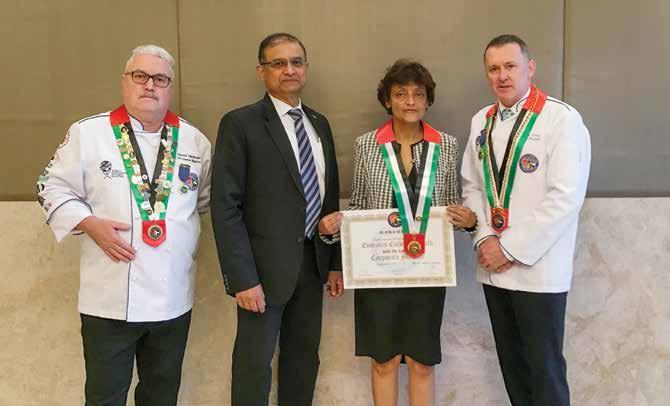
The Alaska Seafood Marketing Institute (ASMI)
The seafood bounty of Alaska is unrivalled. From five species of wild salmon to a variety of whitefish, and shellfish, Alaska offers an extraordinary range that delights chefs and home cooks alike. What sets Alaska seafood apart is more than abundance—it is an uncompromising commitment to offer Wild, Natural, and Sustainable seafood.
Wild at Heart
Alaska seafood is 100% wild caught. Salmon, whitefish, and shellfish live and mature at nature’s pace, swimming freely in the cold, pristine waters surrounding Alaska’s 34,000 miles of coastline. As a result, Alaska seafood reflects wilderness itself—pure, vibrant, and unmatched in flavour.
Naturally Pure
Alaska’s clean, icy waters are home to seafood untouched by artificial colouring, additives, or preservatives. From ocean to plate, Alaska seafood
retains the integrity of its environment, translated in the essential nutrients, vitamins, and minerals that make it as wholesome as it is delicious.
Responsibly Managed
Sustainability in Alaska is not a marketing claim—it is the law. Alaska is the only U.S. state with a constitutionally mandated commitment to sustainable fishing. Fishermen, scientists, processors, and local communities work together to ensure healthy fish populations and thriving coastal economies for generations to come.
Premium Quality & Healthy Living
Naturally low in saturated fat and
rich in omega-3 fatty acids, Alaska seafood is both premium and healthful. Promptly frozen at sea or at shore-based processing facilities, freshness and nutrients are immediately locked in to ensure a world-class culinary experience from sea to table.
For Alaskans, fishing is tradition. Family-run vessels and operations pass down knowledge through generations, reinforcing a cultural bond with the sea and a dedication to producing seafood with integrity and pride.
Certified Seafood International (CSI) complements these values as a credible, globally recognized certification for wild-capture seafood. By upholding sustainable fishery management and ensuring full traceability with harvest origin clearly identified on its ecolabel, CSI provides assurance that Alaska’s seafood truly sets the gold standard: Wild, Natural, Sustainable, and undeniably delicious. ■
Between language barriers, oven timers, the constant juggle of chaos, motherhood, and ambition, Chef Andrea Karidis is rewriting her lexicon of success
Let us be honest; most chefs have a story. Mine? It is more of a globetrotting, slow-burn dramedy with a splash of chaos. Okay, fine; maybe it is a tsunami of chaos. I did not grow up in a house where cooking was romanticized. My mom cooked because someone had to feed hungry kids, and my grandma? She treated the kitchen like it was on fire. However, it was the men, my father and grandfather, who really introduced me to the magic of food.
I started as a teenager bussing and waiting tables in my family's Greek restaurant in freezing cold Ottawa while other kids were having snowball fights. Fast forward 25 years, and I have traveled to over 50 countries and worked in fivestar hotels, private villas, luxury cruise ships, international food shows, and now… cue dramatic pause… I own my very own restaurant: Salty Sisters Pinsaria & Wine Bar in the historic heart of Panama City.
Yes, Panama, where I opened a business without speaking the language fluently, and where I now juggle a kitchen full of strong personalities with only one other woman on staff. Meanwhile, my kids go to school in Dubai, and I split my life between two continents, surviving on Panamanian coffee, Google Calendar, and a dangerously active credit card.
Learning Spanish was only half the battle. Starting a business in a country where you do not know the rules, and you can bypass with a little extra $$$, is like being on a cooking show with no ingredients and a surprise twist every five minutes. I hired an all-male
Being a woman in this industry means you are constantly balancing
kitchen crew, learned how to charm municipal officers, and yes, one small language mix-up and you are trying to order smoked Mozzarella instead of Mozzarella Smoking a cigarette. It happens and ..... It happened.
Being a woman boss in a maledominated industry is tough. What do you do in Latin America? Add three espresso shots and stir. You learn quickly when to push, when to play nice, and when to smile through a condescending comment because you have 10 pinsa in the oven and a full house.
But here is the real plot twist. I am actually loving it all! I do not apologize for wanting more, for taking time for myself, or for choosing joy over guilt. There is a strange cultural pressure on women to feel bad for enjoying life, especially when you are a mother. I have decided to opt out. Having adventure trips alone with my amazing husband, saying yes to beach days, and brunch. Biking with drinks, wild dinner parties, spontaneous creative projects, and even the occasional spa day. Why? Because I am not just building a business, I am building a life I love and an example for my daughters that you can do whatever feels right for you!
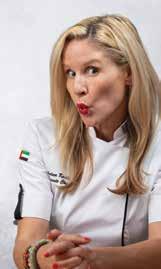
Now, about the dough: Pinsa is not just pizza with a new passport. It is made from a mix of soy, rice, and wheat flour, cold fermented for 72 hours, and baked into something so light and crisp, it is basically a cloud in crust form. In Panama, it is still a hidden gem, but not for long. I am on a mission to make pinsa the next global food obsession, one perfectly imperfect oval at a time. Actually, to tell you the truth, it does sound amazing.... but I do not even know what I feel like for dinner.
And when I am not dishing up pinsa, I am still active in Dubai's culinary scene, hosting private dinners, teaching masterclasses, developing recipes, and saying yes to nearly every food adventure that comes my way. Even when I am running on two hours of sleep, coffee, and cheese and meat samples, I would not trade it for anything.
Being a woman in this industry means you are constantly balancing. It is grit and grace, fire and finesse. I have faced exclusion, misjudgment, and more microchallenges than I can count. But I have also built teams, created many opportunities, and earned my place at the table.
And just when you think that is enough... surprise! I also produce my own artisanal drink: Café Salado. Made in Panama using local sugarcane, infused with coffee, and aged in ocean-washed barrels. But that is a whole other story. TBC.....
So if you ever find yourself in Panama, drop by for a pinsa and a sip. I promise, it is worth the flight. ■


